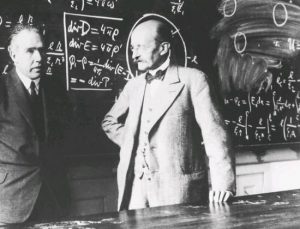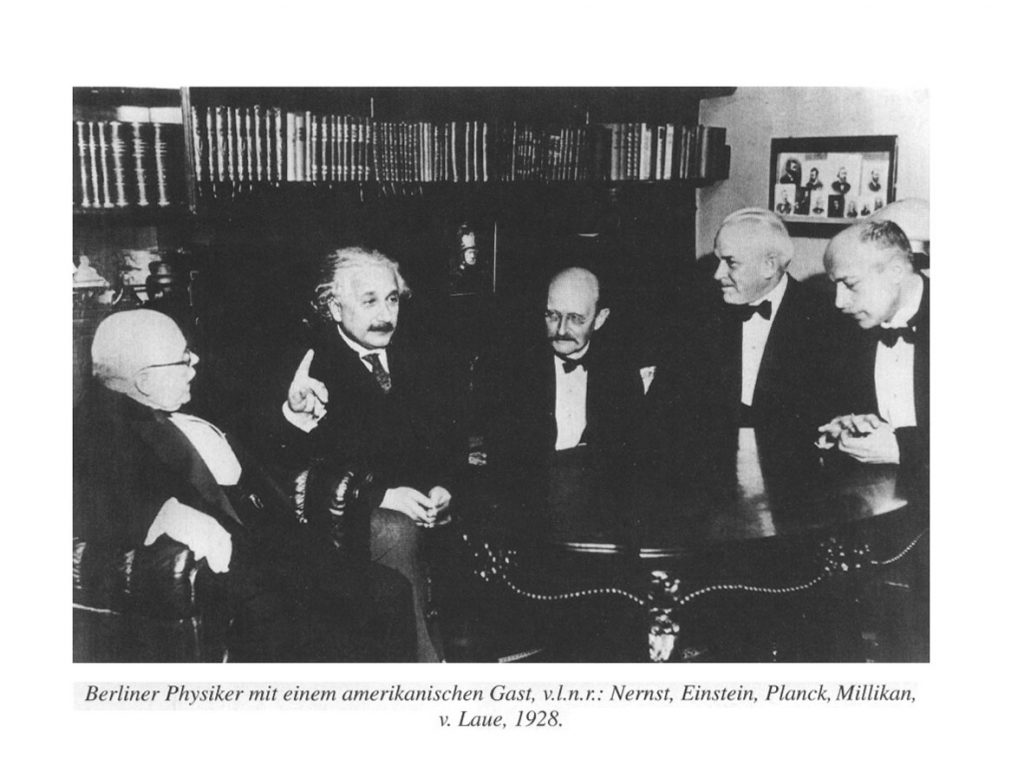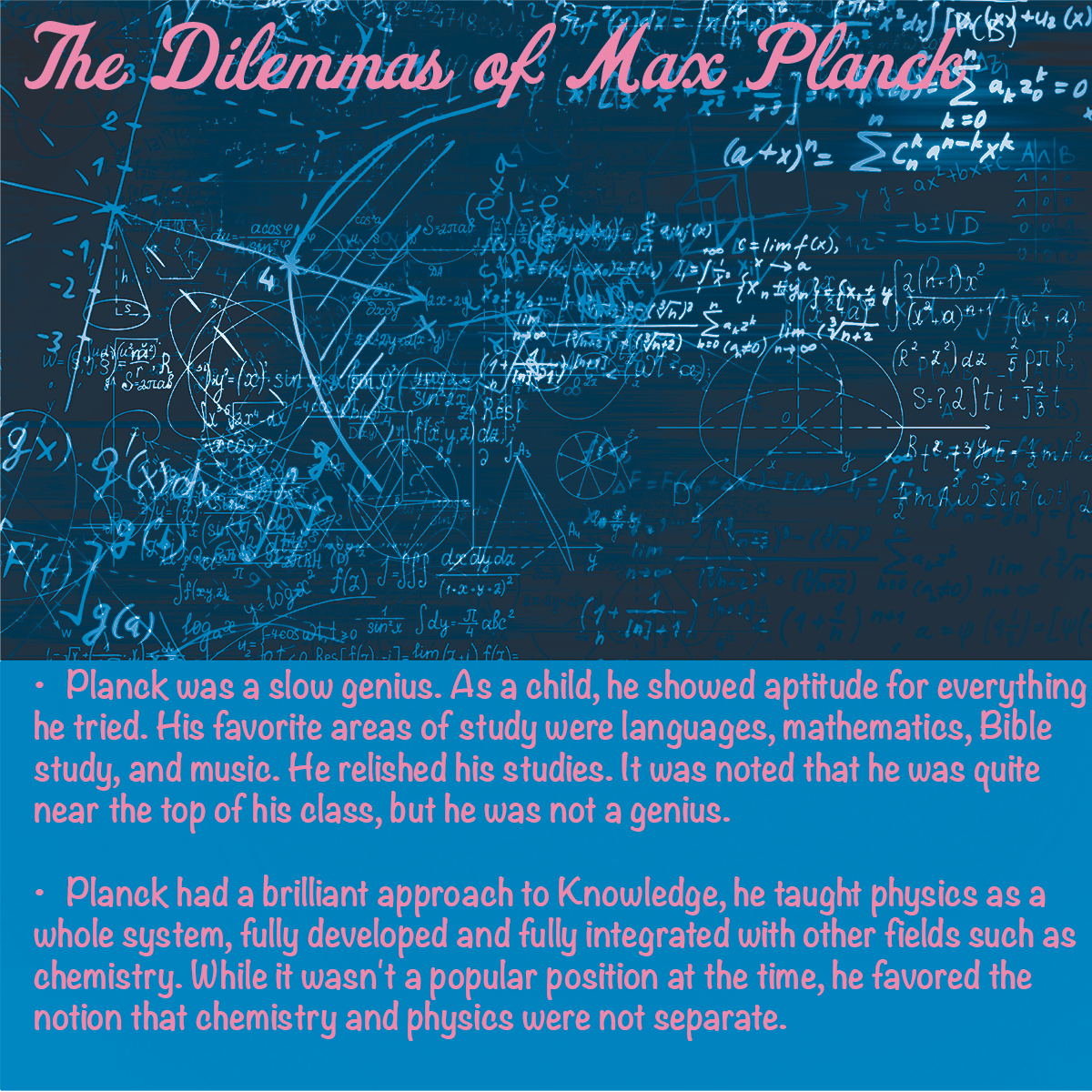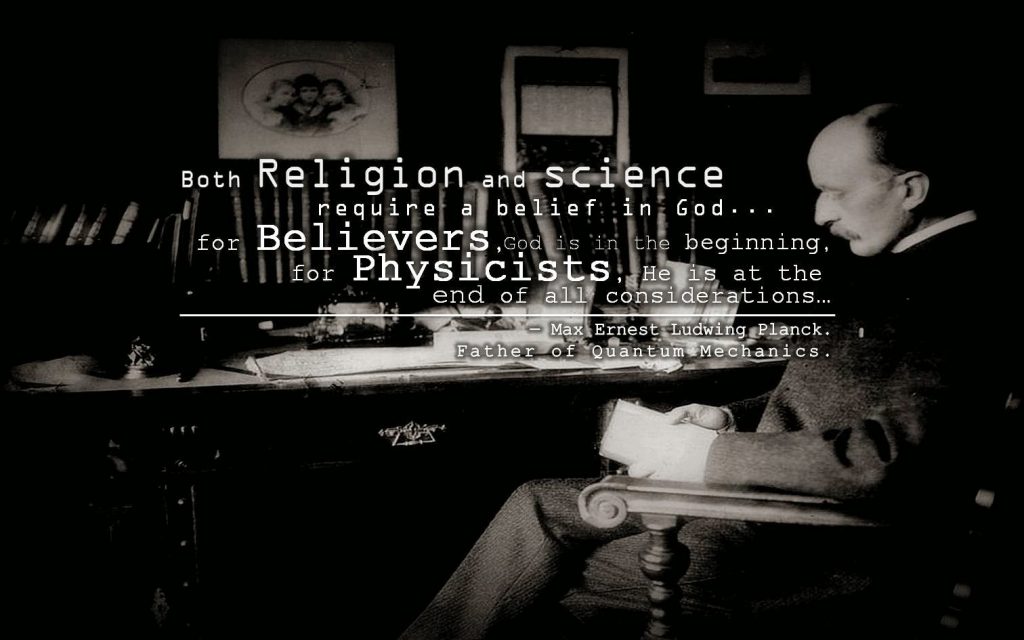Albert Einstein wrote in 1948, “Even in these times of ours when political passion and brute force hang like swords over the anguished heads of men, that even in such times there is being held high and undimmed the standard of our ideal search for the truth. This ideal, a bond forever uniting scientists in all times and in all places, was realised with rare completeness in Max Planck.” Einstein further described Planck’s 1900 discovery “as the basis of all 20th century research in physics and has almost entirely conditioned it’s development ever since. Without it’s discovery, it would not have been possible to establish a workable theory of atoms and molecules and the energetic process which govern their transformation.
A slow genius As a child, Planck showed aptitude for everything he tried. His favourites were languages, mathematics, Bible study, and music. He relished his studies. It was noted that he was quite near the top of his class, but he was not a genius. However, he was slow to say he knew something until he understood all the nuances in the field up to the most recent advancements
This sort of mentality channelled Planck’s thoughts to physics as his thesis. When his advisor tried to persuade him to leave the field as “everything has already been discovered,” Planck stayed the course claiming he’d be just as happy to deepen our understanding of the world. This approach, combined with his fascination of atoms, lead Planck to investigating the relationships that tie physics and the atoms together for a lifetime. Thus, Max Planck was able to uncover the fields of thermodynamics, black-body radiation, and working with Albert Einstein, able to deepen quantum theory.
A Brilliant Approach to Knowledge Niels Bohr and Max Planck Planck taught physics as a whole system, fully developed and fully integrated with other fields such as chemistry. While it wasn’t a popular position at the time, he favoured the notion that chemistry and physics were not separate because that is not how things exist in nature.
Planck believed in this integrated approach so steadily that he got into a written combat with the Positivists
Amusingly enough, Planck also encouraged questions of all levels while teaching. He believed that all outcome of all questions were good. Brown
Voice of Reason between the World Wars Max Planck came into his own during World War I, then became more popular and respected not just in his field, but also in a larger political sphere. He had a love of country, but also a calm demeanor that people respected and looked up to. The fact that he was the father of quantum physics and developed the field of thermodynamics gave Planck more street cred in the eyes of the German people as well as his colleagues.
As the Wiemar republic wobbled and Germany rebuilt after WWI, Planck sought a way to keep the expensive enterprise of science going without relying on the wobbly Wiemar government. He joined forces with the chemist Fritz Haber and Adolf von Harnack to found the Notgemeinschaft, a private society that could fundraiser around the world then dispense grants to the scientists at home. The project was a qualified success, raising 8 million marks and winning contributions from a lot of companies Notgemeinschaft was no longer active.
Max Planck was dedicated to science in a way that saved him from a lot of drama in his life. His first wife died from tuberculous 19 years after they were married, leaving Planck a single father to four children. Although Planck remarried later on, his family quickly fell apart again when one of his daughters died during childbirth, his eldest son was killed in action in WWI, and his youngest son was taken prisoner in WWI. It was only Planck’s optimism and love of science that kept him moving forward during his darkest times.
Science and The Nazi Regime During the first 74 years of his life, Max Planck loved his Prussian countrymen, loved the culture, and loved science. Although Planck viewed the Nazi party with ambivalence at first, he eventually grew to detest the Nazi party. He viewed them as irrational, and even went so far as to promote Einstein in his speeches — a jab to the Nazi party that viewed Planck as a national treasure for his brilliance
Planck went further in his writings, reflecting on his own role, and other’s, for what happened during the Nazi regime:
“Under no circumstance can there be in this domain [one’s own conscience] the slightest moral compromise, the slightest moral justification for the smallest deviation. He who violates this commandment, perhaps in the endeavour to gain some momentary worldly advantage, by deliberately and knowingly shutting his eyes to the proper evaluation of the true situation, is like a spendthrift who thoughtlessly squanders away his wealth, and who must inevitably suffer, sooner or later, the grave consequences of his foolhardiness.” — Planck, in the closing paragraph of Phantom Problems
Despite of all his optimism, Max Planck clearly struggled with the culture being divided and torn apart around him. In the end the Nazi regime even murdered his son, Erwin, who operated actively against the Nazi regime. At age 87, Max Planck pled for his son’s life by writing a short, simple letter directly to Hitler
Planck left a scientific legacy that can be summed up with what his friends called the Planck Principle:
A new scientific truth does not triumph by convincing its opponents and making them see the light, but rather because its opponents eventually die and a new generation grows up that is familiar with it.
{21495:3DEJDKAM};{21495:FX3T5XMG};{21495:9P964ARU};{21495:9P964ARU};{21495:FX3T5XMG};{21495:FX3T5XMG},{21495:9P964ARU};{21495:LUI7TF7A};{21495:6Q2TQ7Z8}
apa
default
asc
0
6726
%7B%22status%22%3A%22success%22%2C%22updateneeded%22%3Afalse%2C%22instance%22%3Afalse%2C%22meta%22%3A%7B%22request_last%22%3A400%2C%22request_next%22%3A50%2C%22used_cache%22%3Atrue%7D%2C%22data%22%3A%5B%7B%22key%22%3A%22WKZSS9ZS%22%2C%22library%22%3A%7B%22id%22%3A21495%7D%2C%22meta%22%3A%7B%22creatorSummary%22%3A%22Alananbeh%20et%20al.%22%2C%22parsedDate%22%3A%222014-12-01%22%2C%22numChildren%22%3A1%7D%2C%22bib%22%3A%22%26lt%3Bdiv%20class%3D%26quot%3Bcsl-bib-body%26quot%3B%20style%3D%26quot%3Bline-height%3A%202%3B%20padding-left%3A%201em%3B%20text-indent%3A-1em%3B%26quot%3B%26gt%3B%5Cn%20%20%26lt%3Bdiv%20class%3D%26quot%3Bcsl-entry%26quot%3B%26gt%3BAlananbeh%2C%20K.%20M.%2C%20Bouqellah%2C%20N.%20A.%2C%20%26amp%3B%20Al%20Kaff%2C%20N.%20S.%20%282014%29.%20Cultivation%20of%20oyster%20mushroom%20%26lt%3Bi%26gt%3BPleurotus%20ostreatus%26lt%3B%5C%2Fi%26gt%3B%20on%20date-palm%20leaves%20mixed%20with%20other%20agro-wastes%20in%20Saudi%20Arabia.%20%26lt%3Bi%26gt%3BSaudi%20Journal%20of%20Biological%20Sciences%26lt%3B%5C%2Fi%26gt%3B%2C%20%26lt%3Bi%26gt%3B21%26lt%3B%5C%2Fi%26gt%3B%286%29%2C%20616%26%23x2013%3B625.%20%26lt%3Ba%20class%3D%26%23039%3Bzp-DOIURL%26%23039%3B%20href%3D%26%23039%3Bhttps%3A%5C%2F%5C%2Fdoi.org%5C%2F10.1016%5C%2Fj.sjbs.2014.08.001%26%23039%3B%26gt%3Bhttps%3A%5C%2F%5C%2Fdoi.org%5C%2F10.1016%5C%2Fj.sjbs.2014.08.001%26lt%3B%5C%2Fa%26gt%3B%26lt%3B%5C%2Fdiv%26gt%3B%5Cn%26lt%3B%5C%2Fdiv%26gt%3B%22%2C%22data%22%3A%7B%22itemType%22%3A%22journalArticle%22%2C%22title%22%3A%22Cultivation%20of%20oyster%20mushroom%20%3Ci%3EPleurotus%20ostreatus%3C%5C%2Fi%3E%20on%20date-palm%20leaves%20mixed%20with%20other%20agro-wastes%20in%20Saudi%20Arabia%22%2C%22creators%22%3A%5B%7B%22creatorType%22%3A%22author%22%2C%22firstName%22%3A%22Kholoud%20M.%22%2C%22lastName%22%3A%22Alananbeh%22%7D%2C%7B%22creatorType%22%3A%22author%22%2C%22firstName%22%3A%22Nahla%20A.%22%2C%22lastName%22%3A%22Bouqellah%22%7D%2C%7B%22creatorType%22%3A%22author%22%2C%22firstName%22%3A%22Nadia%20S.%22%2C%22lastName%22%3A%22Al%20Kaff%22%7D%5D%2C%22abstractNote%22%3A%22Promoting%20the%20use%20of%20agricultural%20waste%20is%20one%20of%20the%20newly%20prepared%20water%20and%20environment%20friendly%20agriculture%20strategies%20in%20the%20Kingdom%20of%20Saudi%20Arabia%20%28KSA%29.%20The%20objective%20of%20this%20research%20was%20to%20study%20the%20efficiency%20of%20cultivating%20oyster%20mushroom%20%28Pleurotus%20ostreatus%29%20on%20date%20palm%20wastes%20mixed%20with%20other%20agricultural%20wastes%20available%20in%20KSA.%20Four%20agricultural%20wastes%20were%20mixed%20with%20date%20palm%20leaves%20at%20different%20ratios%2C%20with%20two%20supplements%20and%20three%20spawn%20rates%20were%20used.%20Wheat%20straw%20mixed%20with%20date%20palm%20at%20ratio%20of%2025%20%28date%20palm%29%3A%2075%20%28agro-waste%29%20showed%20the%20best%20results%20in%20most%20of%20the%20parameters%20measured.%20Corn%20meal%20was%20superior%20over%20wheat%20bran%20as%20a%20supplement%20in%20all%20treatments.%20Parameter%20values%20increased%20with%20the%20increase%20of%20the%20spawn%20rate%20of%20P.%20ostreatus.%20Treatments%20with%20date%20palm%20leave%20wastes%20contained%20higher%20carbohydrates%20and%20fibers.%20No%20significant%20differences%20were%20found%20among%20the%20fruiting%20bodies%20produced%20on%20the%20different%20agro-wastes%20studied%20for%20the%20different%20proximates%20analyzed.%20Analyses%20of%20metal%20concentration%20showed%20that%20potassium%20was%20the%20highest%20in%20all%20the%20treatments%20tested%20followed%20by%20Na%2C%20Mg%2C%20Ca%2C%20and%20Zn.%20This%20is%20the%20first%20study%20that%20reported%20the%20success%20of%20growing%20oyster%20mushroom%20on%20date%20palm%20leaf%20wastes%20mixed%20with%20other%20agro-wastes%20obtainable%20in%20KSA.%22%2C%22date%22%3A%222014-12-01%22%2C%22language%22%3A%22%22%2C%22DOI%22%3A%2210.1016%5C%2Fj.sjbs.2014.08.001%22%2C%22ISSN%22%3A%221319-562X%22%2C%22url%22%3A%22https%3A%5C%2F%5C%2Fwww.sciencedirect.com%5C%2Fscience%5C%2Farticle%5C%2Fpii%5C%2FS1319562X1400093X%22%2C%22collections%22%3A%5B%5D%2C%22dateModified%22%3A%222024-02-28T02%3A53%3A48Z%22%7D%7D%2C%7B%22key%22%3A%22KCBQSI9L%22%2C%22library%22%3A%7B%22id%22%3A21495%7D%2C%22meta%22%3A%7B%22creatorSummary%22%3A%22John%20Baptist%20Porta%22%2C%22parsedDate%22%3A%221658%22%2C%22numChildren%22%3A0%7D%2C%22bib%22%3A%22%26lt%3Bdiv%20class%3D%26quot%3Bcsl-bib-body%26quot%3B%20style%3D%26quot%3Bline-height%3A%202%3B%20padding-left%3A%201em%3B%20text-indent%3A-1em%3B%26quot%3B%26gt%3B%5Cn%20%20%26lt%3Bdiv%20class%3D%26quot%3Bcsl-entry%26quot%3B%26gt%3BJohn%20Baptist%20Porta.%20%281658%29.%20%26lt%3Bi%26gt%3BNatural%20Magick%26lt%3B%5C%2Fi%26gt%3B.%20%26lt%3Ba%20class%3D%26%23039%3Bzp-ItemURL%26%23039%3B%20href%3D%26%23039%3Bhttp%3A%5C%2F%5C%2Fwww.faculty.umb.edu%5C%2Fgary_zabel%5C%2FCourses%5C%2FPhil%2520281b%5C%2FPhilosophy%2520of%2520Magic%5C%2FNatural_Magic%5C%2Fjportat2.html%26%23039%3B%26gt%3Bhttp%3A%5C%2F%5C%2Fwww.faculty.umb.edu%5C%2Fgary_zabel%5C%2FCourses%5C%2FPhil%2520281b%5C%2FPhilosophy%2520of%2520Magic%5C%2FNatural_Magic%5C%2Fjportat2.html%26lt%3B%5C%2Fa%26gt%3B%26lt%3B%5C%2Fdiv%26gt%3B%5Cn%26lt%3B%5C%2Fdiv%26gt%3B%22%2C%22data%22%3A%7B%22itemType%22%3A%22book%22%2C%22title%22%3A%22Natural%20Magick%22%2C%22creators%22%3A%5B%7B%22creatorType%22%3A%22author%22%2C%22name%22%3A%22John%20Baptist%20Porta%22%7D%5D%2C%22abstractNote%22%3A%22%22%2C%22date%22%3A%221658%22%2C%22language%22%3A%22%22%2C%22ISBN%22%3A%22%22%2C%22url%22%3A%22http%3A%5C%2F%5C%2Fwww.faculty.umb.edu%5C%2Fgary_zabel%5C%2FCourses%5C%2FPhil%2520281b%5C%2FPhilosophy%2520of%2520Magic%5C%2FNatural_Magic%5C%2Fjportat2.html%22%2C%22collections%22%3A%5B%22M2SY7594%22%5D%2C%22dateModified%22%3A%222023-04-21T14%3A43%3A32Z%22%7D%7D%2C%7B%22key%22%3A%22NFW9C9P2%22%2C%22library%22%3A%7B%22id%22%3A21495%7D%2C%22meta%22%3A%7B%22creatorSummary%22%3A%22Galilei%20and%20Brunetti%22%2C%22parsedDate%22%3A%221980%22%2C%22numChildren%22%3A0%7D%2C%22bib%22%3A%22%26lt%3Bdiv%20class%3D%26quot%3Bcsl-bib-body%26quot%3B%20style%3D%26quot%3Bline-height%3A%202%3B%20padding-left%3A%201em%3B%20text-indent%3A-1em%3B%26quot%3B%26gt%3B%5Cn%20%20%26lt%3Bdiv%20class%3D%26quot%3Bcsl-entry%26quot%3B%26gt%3BGalilei%2C%20G.%2C%20%26amp%3B%20Brunetti%2C%20F.%20%281980%29.%20%26lt%3Bi%26gt%3BOpere%20di%20Galileo%20Galilei.%20Vol.%202%26lt%3B%5C%2Fi%26gt%3B%20%282.%20ed.%20riv.%20e%20corr%2C%20Vol.%202%29.%20Unione%20Tipografico-Ed.%20Torinese.%26lt%3B%5C%2Fdiv%26gt%3B%5Cn%26lt%3B%5C%2Fdiv%26gt%3B%22%2C%22data%22%3A%7B%22itemType%22%3A%22book%22%2C%22title%22%3A%22Opere%20di%20Galileo%20Galilei.%20Vol.%202%22%2C%22creators%22%3A%5B%7B%22creatorType%22%3A%22author%22%2C%22firstName%22%3A%22Galileo%22%2C%22lastName%22%3A%22Galilei%22%7D%2C%7B%22creatorType%22%3A%22author%22%2C%22firstName%22%3A%22Franz%22%2C%22lastName%22%3A%22Brunetti%22%7D%5D%2C%22abstractNote%22%3A%22%22%2C%22date%22%3A%221980%22%2C%22language%22%3A%22ita%22%2C%22ISBN%22%3A%22978-88-02-03457-7%22%2C%22url%22%3A%22%22%2C%22collections%22%3A%5B%22M2SY7594%22%5D%2C%22dateModified%22%3A%222023-04-21T13%3A58%3A05Z%22%7D%7D%2C%7B%22key%22%3A%22763CV4US%22%2C%22library%22%3A%7B%22id%22%3A21495%7D%2C%22meta%22%3A%7B%22creatorSummary%22%3A%22Vitruvius%20Pollio%22%2C%22parsedDate%22%3A%221914%22%2C%22numChildren%22%3A0%7D%2C%22bib%22%3A%22%26lt%3Bdiv%20class%3D%26quot%3Bcsl-bib-body%26quot%3B%20style%3D%26quot%3Bline-height%3A%202%3B%20padding-left%3A%201em%3B%20text-indent%3A-1em%3B%26quot%3B%26gt%3B%5Cn%20%20%26lt%3Bdiv%20class%3D%26quot%3Bcsl-entry%26quot%3B%26gt%3BVitruvius%20Pollio.%20%281914%29.%20%26lt%3Bi%26gt%3BVitruvius%2C%20the%20Ten%20Books%20on%20Architecture%26lt%3B%5C%2Fi%26gt%3B.%20Harvard%20University%20Press.%26lt%3B%5C%2Fdiv%26gt%3B%5Cn%26lt%3B%5C%2Fdiv%26gt%3B%22%2C%22data%22%3A%7B%22itemType%22%3A%22book%22%2C%22title%22%3A%22Vitruvius%2C%20the%20Ten%20Books%20on%20Architecture%22%2C%22creators%22%3A%5B%7B%22creatorType%22%3A%22author%22%2C%22name%22%3A%22Vitruvius%20Pollio%22%7D%5D%2C%22abstractNote%22%3A%22%22%2C%22date%22%3A%221914%22%2C%22language%22%3A%22%22%2C%22ISBN%22%3A%22%22%2C%22url%22%3A%22%22%2C%22collections%22%3A%5B%22M2SY7594%22%5D%2C%22dateModified%22%3A%222023-04-21T01%3A17%3A27Z%22%7D%7D%2C%7B%22key%22%3A%22BITYGBPP%22%2C%22library%22%3A%7B%22id%22%3A21495%7D%2C%22meta%22%3A%7B%22creatorSummary%22%3A%22Kashihara%20et%20al.%22%2C%22parsedDate%22%3A%222009%22%2C%22numChildren%22%3A1%7D%2C%22bib%22%3A%22%26lt%3Bdiv%20class%3D%26quot%3Bcsl-bib-body%26quot%3B%20style%3D%26quot%3Bline-height%3A%202%3B%20padding-left%3A%201em%3B%20text-indent%3A-1em%3B%26quot%3B%26gt%3B%5Cn%20%20%26lt%3Bdiv%20class%3D%26quot%3Bcsl-entry%26quot%3B%26gt%3BKashihara%2C%20K.%2C%20Maruyama%2C%20T.%2C%20Murota%2C%20M.%2C%20%26amp%3B%20Nakahara%2C%20Y.%20%282009%29.%20Positive%20Effects%20of%20Acute%20and%20Moderate%20Physical%20Exercise%20on%20Cognitive%20Function.%20%26lt%3Bi%26gt%3BJournal%20of%20PHYSIOLOGICAL%20ANTHROPOLOGY%26lt%3B%5C%2Fi%26gt%3B%2C%20%26lt%3Bi%26gt%3B28%26lt%3B%5C%2Fi%26gt%3B%284%29%2C%20155%26%23x2013%3B164.%20%26lt%3Ba%20class%3D%26%23039%3Bzp-DOIURL%26%23039%3B%20href%3D%26%23039%3Bhttps%3A%5C%2F%5C%2Fdoi.org%5C%2F10.2114%5C%2Fjpa2.28.155%26%23039%3B%26gt%3Bhttps%3A%5C%2F%5C%2Fdoi.org%5C%2F10.2114%5C%2Fjpa2.28.155%26lt%3B%5C%2Fa%26gt%3B%26lt%3B%5C%2Fdiv%26gt%3B%5Cn%26lt%3B%5C%2Fdiv%26gt%3B%22%2C%22data%22%3A%7B%22itemType%22%3A%22journalArticle%22%2C%22title%22%3A%22Positive%20Effects%20of%20Acute%20and%20Moderate%20Physical%20Exercise%20on%20Cognitive%20Function%22%2C%22creators%22%3A%5B%7B%22creatorType%22%3A%22author%22%2C%22firstName%22%3A%22Koji%22%2C%22lastName%22%3A%22Kashihara%22%7D%2C%7B%22creatorType%22%3A%22author%22%2C%22firstName%22%3A%22Takeo%22%2C%22lastName%22%3A%22Maruyama%22%7D%2C%7B%22creatorType%22%3A%22author%22%2C%22firstName%22%3A%22Masao%22%2C%22lastName%22%3A%22Murota%22%7D%2C%7B%22creatorType%22%3A%22author%22%2C%22firstName%22%3A%22Yoshibumi%22%2C%22lastName%22%3A%22Nakahara%22%7D%5D%2C%22abstractNote%22%3A%22%22%2C%22date%22%3A%222009%22%2C%22language%22%3A%22en%22%2C%22DOI%22%3A%2210.2114%5C%2Fjpa2.28.155%22%2C%22ISSN%22%3A%221880-6805%2C%201880-6791%22%2C%22url%22%3A%22http%3A%5C%2F%5C%2Fwww.jstage.jst.go.jp%5C%2Farticle%5C%2Fjpa2%5C%2F28%5C%2F4%5C%2F28_4_155%5C%2F_article%22%2C%22collections%22%3A%5B%2245CMI76K%22%5D%2C%22dateModified%22%3A%222023-02-24T19%3A29%3A35Z%22%7D%7D%2C%7B%22key%22%3A%22IZ48BJH8%22%2C%22library%22%3A%7B%22id%22%3A21495%7D%2C%22meta%22%3A%7B%22creatorSummary%22%3A%22Mandolesi%20et%20al.%22%2C%22parsedDate%22%3A%222018-04-27%22%2C%22numChildren%22%3A1%7D%2C%22bib%22%3A%22%26lt%3Bdiv%20class%3D%26quot%3Bcsl-bib-body%26quot%3B%20style%3D%26quot%3Bline-height%3A%202%3B%20padding-left%3A%201em%3B%20text-indent%3A-1em%3B%26quot%3B%26gt%3B%5Cn%20%20%26lt%3Bdiv%20class%3D%26quot%3Bcsl-entry%26quot%3B%26gt%3BMandolesi%2C%20L.%2C%20Polverino%2C%20A.%2C%20Montuori%2C%20S.%2C%20Foti%2C%20F.%2C%20Ferraioli%2C%20G.%2C%20Sorrentino%2C%20P.%2C%20%26amp%3B%20Sorrentino%2C%20G.%20%282018%29.%20Effects%20of%20Physical%20Exercise%20on%20Cognitive%20Functioning%20and%20Wellbeing%3A%20Biological%20and%20Psychological%20Benefits.%20%26lt%3Bi%26gt%3BFrontiers%20in%20Psychology%26lt%3B%5C%2Fi%26gt%3B%2C%20%26lt%3Bi%26gt%3B9%26lt%3B%5C%2Fi%26gt%3B%2C%20509.%20%26lt%3Ba%20class%3D%26%23039%3Bzp-DOIURL%26%23039%3B%20href%3D%26%23039%3Bhttps%3A%5C%2F%5C%2Fdoi.org%5C%2F10.3389%5C%2Ffpsyg.2018.00509%26%23039%3B%26gt%3Bhttps%3A%5C%2F%5C%2Fdoi.org%5C%2F10.3389%5C%2Ffpsyg.2018.00509%26lt%3B%5C%2Fa%26gt%3B%26lt%3B%5C%2Fdiv%26gt%3B%5Cn%26lt%3B%5C%2Fdiv%26gt%3B%22%2C%22data%22%3A%7B%22itemType%22%3A%22journalArticle%22%2C%22title%22%3A%22Effects%20of%20Physical%20Exercise%20on%20Cognitive%20Functioning%20and%20Wellbeing%3A%20Biological%20and%20Psychological%20Benefits%22%2C%22creators%22%3A%5B%7B%22creatorType%22%3A%22author%22%2C%22firstName%22%3A%22Laura%22%2C%22lastName%22%3A%22Mandolesi%22%7D%2C%7B%22creatorType%22%3A%22author%22%2C%22firstName%22%3A%22Arianna%22%2C%22lastName%22%3A%22Polverino%22%7D%2C%7B%22creatorType%22%3A%22author%22%2C%22firstName%22%3A%22Simone%22%2C%22lastName%22%3A%22Montuori%22%7D%2C%7B%22creatorType%22%3A%22author%22%2C%22firstName%22%3A%22Francesca%22%2C%22lastName%22%3A%22Foti%22%7D%2C%7B%22creatorType%22%3A%22author%22%2C%22firstName%22%3A%22Giampaolo%22%2C%22lastName%22%3A%22Ferraioli%22%7D%2C%7B%22creatorType%22%3A%22author%22%2C%22firstName%22%3A%22Pierpaolo%22%2C%22lastName%22%3A%22Sorrentino%22%7D%2C%7B%22creatorType%22%3A%22author%22%2C%22firstName%22%3A%22Giuseppe%22%2C%22lastName%22%3A%22Sorrentino%22%7D%5D%2C%22abstractNote%22%3A%22%22%2C%22date%22%3A%222018-4-27%22%2C%22language%22%3A%22%22%2C%22DOI%22%3A%2210.3389%5C%2Ffpsyg.2018.00509%22%2C%22ISSN%22%3A%221664-1078%22%2C%22url%22%3A%22http%3A%5C%2F%5C%2Fjournal.frontiersin.org%5C%2Farticle%5C%2F10.3389%5C%2Ffpsyg.2018.00509%5C%2Ffull%22%2C%22collections%22%3A%5B%2245CMI76K%22%5D%2C%22dateModified%22%3A%222023-02-23T22%3A52%3A50Z%22%7D%7D%2C%7B%22key%22%3A%22YGTHB24L%22%2C%22library%22%3A%7B%22id%22%3A21495%7D%2C%22meta%22%3A%7B%22creatorSummary%22%3A%22Douglas%20K%20Detterman%22%2C%22parsedDate%22%3A%221989-05-14%22%2C%22numChildren%22%3A0%7D%2C%22bib%22%3A%22%26lt%3Bdiv%20class%3D%26quot%3Bcsl-bib-body%26quot%3B%20style%3D%26quot%3Bline-height%3A%202%3B%20padding-left%3A%201em%3B%20text-indent%3A-1em%3B%26quot%3B%26gt%3B%5Cn%20%20%26lt%3Bdiv%20class%3D%26quot%3Bcsl-entry%26quot%3B%26gt%3BDouglas%20K%20Detterman.%20%281989%29.%20%26lt%3Bi%26gt%3BModels%20of%20Mental%20Functioning%26lt%3B%5C%2Fi%26gt%3B%20%28Final%20No.%20AFOSR%20RD%2089-0813%29.%20Air%20Force%20Office%20of%20Scientific%20Research.%26lt%3B%5C%2Fdiv%26gt%3B%5Cn%26lt%3B%5C%2Fdiv%26gt%3B%22%2C%22data%22%3A%7B%22itemType%22%3A%22report%22%2C%22title%22%3A%22Models%20of%20Mental%20Functioning%22%2C%22creators%22%3A%5B%7B%22creatorType%22%3A%22author%22%2C%22firstName%22%3A%22%22%2C%22lastName%22%3A%22Douglas%20K%20Detterman%22%7D%5D%2C%22abstractNote%22%3A%22%22%2C%22reportNumber%22%3A%22AFOSR%20RD%2089-0813%22%2C%22reportType%22%3A%22Final%22%2C%22institution%22%3A%22Air%20Force%20Office%20of%20Scientific%20Research%22%2C%22date%22%3A%221989%20May%2014%22%2C%22language%22%3A%22%22%2C%22url%22%3A%22%22%2C%22collections%22%3A%5B%2245CMI76K%22%5D%2C%22dateModified%22%3A%222023-02-22T20%3A03%3A15Z%22%7D%7D%2C%7B%22key%22%3A%22H3SUYFQI%22%2C%22library%22%3A%7B%22id%22%3A21495%7D%2C%22meta%22%3A%7B%22creatorSummary%22%3A%22Li%20et%20al.%22%2C%22parsedDate%22%3A%222017%22%2C%22numChildren%22%3A1%7D%2C%22bib%22%3A%22%26lt%3Bdiv%20class%3D%26quot%3Bcsl-bib-body%26quot%3B%20style%3D%26quot%3Bline-height%3A%202%3B%20padding-left%3A%201em%3B%20text-indent%3A-1em%3B%26quot%3B%26gt%3B%5Cn%20%20%26lt%3Bdiv%20class%3D%26quot%3Bcsl-entry%26quot%3B%26gt%3BLi%2C%20J.%20W.%2C%20O%26%23x2019%3BConnor%2C%20H.%2C%20O%26%23x2019%3BDwyer%2C%20N.%2C%20%26amp%3B%20Orr%2C%20R.%20%282017%29.%20The%20effect%20of%20acute%20and%20chronic%20exercise%20on%20cognitive%20function%20and%20academic%20performance%20in%20adolescents%3A%20A%20systematic%20review.%20%26lt%3Bi%26gt%3BJournal%20of%20Science%20and%20Medicine%20in%20Sport%26lt%3B%5C%2Fi%26gt%3B%2C%20%26lt%3Bi%26gt%3B20%26lt%3B%5C%2Fi%26gt%3B%289%29%2C%20841%26%23x2013%3B848.%20%26lt%3Ba%20class%3D%26%23039%3Bzp-DOIURL%26%23039%3B%20href%3D%26%23039%3Bhttps%3A%5C%2F%5C%2Fdoi.org%5C%2F10.1016%5C%2Fj.jsams.2016.11.025%26%23039%3B%26gt%3Bhttps%3A%5C%2F%5C%2Fdoi.org%5C%2F10.1016%5C%2Fj.jsams.2016.11.025%26lt%3B%5C%2Fa%26gt%3B%26lt%3B%5C%2Fdiv%26gt%3B%5Cn%26lt%3B%5C%2Fdiv%26gt%3B%22%2C%22data%22%3A%7B%22itemType%22%3A%22journalArticle%22%2C%22title%22%3A%22The%20effect%20of%20acute%20and%20chronic%20exercise%20on%20cognitive%20function%20and%20academic%20performance%20in%20adolescents%3A%20A%20systematic%20review%22%2C%22creators%22%3A%5B%7B%22creatorType%22%3A%22author%22%2C%22firstName%22%3A%22Joanna%20W.%22%2C%22lastName%22%3A%22Li%22%7D%2C%7B%22creatorType%22%3A%22author%22%2C%22firstName%22%3A%22Helen%22%2C%22lastName%22%3A%22O%5Cu2019Connor%22%7D%2C%7B%22creatorType%22%3A%22author%22%2C%22firstName%22%3A%22Nicholas%22%2C%22lastName%22%3A%22O%5Cu2019Dwyer%22%7D%2C%7B%22creatorType%22%3A%22author%22%2C%22firstName%22%3A%22Rhonda%22%2C%22lastName%22%3A%22Orr%22%7D%5D%2C%22abstractNote%22%3A%22%22%2C%22date%22%3A%2209%5C%2F2017%22%2C%22language%22%3A%22en%22%2C%22DOI%22%3A%2210.1016%5C%2Fj.jsams.2016.11.025%22%2C%22ISSN%22%3A%2214402440%22%2C%22url%22%3A%22https%3A%5C%2F%5C%2Flinkinghub.elsevier.com%5C%2Fretrieve%5C%2Fpii%5C%2FS1440244017302694%22%2C%22collections%22%3A%5B%2245CMI76K%22%5D%2C%22dateModified%22%3A%222023-01-20T18%3A53%3A42Z%22%7D%7D%2C%7B%22key%22%3A%22IFJ6BT35%22%2C%22library%22%3A%7B%22id%22%3A21495%7D%2C%22meta%22%3A%7B%22creatorSummary%22%3A%22Diamond%22%2C%22parsedDate%22%3A%222013-01-03%22%2C%22numChildren%22%3A1%7D%2C%22bib%22%3A%22%26lt%3Bdiv%20class%3D%26quot%3Bcsl-bib-body%26quot%3B%20style%3D%26quot%3Bline-height%3A%202%3B%20padding-left%3A%201em%3B%20text-indent%3A-1em%3B%26quot%3B%26gt%3B%5Cn%20%20%26lt%3Bdiv%20class%3D%26quot%3Bcsl-entry%26quot%3B%26gt%3BDiamond%2C%20A.%20%282013%29.%20Executive%20Functions.%20%26lt%3Bi%26gt%3BAnnual%20Review%20of%20Psychology%26lt%3B%5C%2Fi%26gt%3B%2C%20%26lt%3Bi%26gt%3B64%26lt%3B%5C%2Fi%26gt%3B%281%29%2C%20135%26%23x2013%3B168.%20%26lt%3Ba%20class%3D%26%23039%3Bzp-DOIURL%26%23039%3B%20href%3D%26%23039%3Bhttps%3A%5C%2F%5C%2Fdoi.org%5C%2F10.1146%5C%2Fannurev-psych-113011-143750%26%23039%3B%26gt%3Bhttps%3A%5C%2F%5C%2Fdoi.org%5C%2F10.1146%5C%2Fannurev-psych-113011-143750%26lt%3B%5C%2Fa%26gt%3B%26lt%3B%5C%2Fdiv%26gt%3B%5Cn%26lt%3B%5C%2Fdiv%26gt%3B%22%2C%22data%22%3A%7B%22itemType%22%3A%22journalArticle%22%2C%22title%22%3A%22Executive%20Functions%22%2C%22creators%22%3A%5B%7B%22creatorType%22%3A%22author%22%2C%22firstName%22%3A%22Adele%22%2C%22lastName%22%3A%22Diamond%22%7D%5D%2C%22abstractNote%22%3A%22Executive%20functions%20%28EFs%29%20make%20possible%20mentally%20playing%20with%20ideas%3B%20taking%20the%20time%20to%20think%20before%20acting%3B%20meeting%20novel%2C%20unanticipated%20challenges%3B%20resisting%20temptations%3B%20and%20staying%20focused.%20Core%20EFs%20are%20inhibition%20%5Bresponse%20inhibition%20%28self-control%5Cu2014resisting%20temptations%20and%20resisting%20acting%20impulsively%29%20and%20interference%20control%20%28selective%20attention%20and%20cognitive%20inhibition%29%5D%2C%20working%20memory%2C%20and%20cognitive%20flexibility%20%28including%20creatively%20thinking%20%5Cu201coutside%20the%20box%2C%5Cu201d%20seeing%20anything%20from%20different%20perspectives%2C%20and%20quickly%20and%20flexibly%20adapting%20to%20changed%20circumstances%29.%20The%20developmental%20progression%20and%20representative%20measures%20of%20each%20are%20discussed.%20Controversies%20are%20addressed%20%28e.g.%2C%20the%20relation%20between%20EFs%20and%20fluid%20intelligence%2C%20self-regulation%2C%20executive%20attention%2C%20and%20effortful%20control%2C%20and%20the%20relation%20between%20working%20memory%20and%20inhibition%20and%20attention%29.%20The%20importance%20of%20social%2C%20emotional%2C%20and%20physical%20health%20for%20cognitive%20health%20is%20discussed%20because%20stress%2C%20lack%20of%20sleep%2C%20loneliness%2C%20or%20lack%20of%20exercise%20each%20impair%20EFs.%20That%20EFs%20are%20trainable%20and%20can%20be%20improved%20with%20practice%20is%20addressed%2C%20including%20diverse%20methods%20tried%20thus%20far.%22%2C%22date%22%3A%222013-01-03%22%2C%22language%22%3A%22en%22%2C%22DOI%22%3A%2210.1146%5C%2Fannurev-psych-113011-143750%22%2C%22ISSN%22%3A%220066-4308%2C%201545-2085%22%2C%22url%22%3A%22https%3A%5C%2F%5C%2Fwww.annualreviews.org%5C%2Fdoi%5C%2F10.1146%5C%2Fannurev-psych-113011-143750%22%2C%22collections%22%3A%5B%2245CMI76K%22%5D%2C%22dateModified%22%3A%222023-01-20T15%3A41%3A28Z%22%7D%7D%2C%7B%22key%22%3A%22JDD3YZSP%22%2C%22library%22%3A%7B%22id%22%3A21495%7D%2C%22meta%22%3A%7B%22creatorSummary%22%3A%22Davis%20et%20al.%22%2C%22parsedDate%22%3A%222011%22%2C%22numChildren%22%3A1%7D%2C%22bib%22%3A%22%26lt%3Bdiv%20class%3D%26quot%3Bcsl-bib-body%26quot%3B%20style%3D%26quot%3Bline-height%3A%202%3B%20padding-left%3A%201em%3B%20text-indent%3A-1em%3B%26quot%3B%26gt%3B%5Cn%20%20%26lt%3Bdiv%20class%3D%26quot%3Bcsl-entry%26quot%3B%26gt%3BDavis%2C%20C.%20L.%2C%20Tomporowski%2C%20P.%20D.%2C%20McDowell%2C%20J.%20E.%2C%20Austin%2C%20B.%20P.%2C%20Miller%2C%20P.%20H.%2C%20Yanasak%2C%20N.%20E.%2C%20Allison%2C%20J.%20D.%2C%20%26amp%3B%20Naglieri%2C%20J.%20A.%20%282011%29.%20Exercise%20improves%20executive%20function%20and%20achievement%20and%20alters%20brain%20activation%20in%20overweight%20children%3A%20A%20randomized%2C%20controlled%20trial.%20%26lt%3Bi%26gt%3BHealth%20Psychology%26lt%3B%5C%2Fi%26gt%3B%2C%20%26lt%3Bi%26gt%3B30%26lt%3B%5C%2Fi%26gt%3B%281%29%2C%2091%26%23x2013%3B98.%20%26lt%3Ba%20class%3D%26%23039%3Bzp-DOIURL%26%23039%3B%20href%3D%26%23039%3Bhttps%3A%5C%2F%5C%2Fdoi.org%5C%2F10.1037%5C%2Fa0021766%26%23039%3B%26gt%3Bhttps%3A%5C%2F%5C%2Fdoi.org%5C%2F10.1037%5C%2Fa0021766%26lt%3B%5C%2Fa%26gt%3B%26lt%3B%5C%2Fdiv%26gt%3B%5Cn%26lt%3B%5C%2Fdiv%26gt%3B%22%2C%22data%22%3A%7B%22itemType%22%3A%22journalArticle%22%2C%22title%22%3A%22Exercise%20improves%20executive%20function%20and%20achievement%20and%20alters%20brain%20activation%20in%20overweight%20children%3A%20A%20randomized%2C%20controlled%20trial.%22%2C%22creators%22%3A%5B%7B%22creatorType%22%3A%22author%22%2C%22firstName%22%3A%22Catherine%20L.%22%2C%22lastName%22%3A%22Davis%22%7D%2C%7B%22creatorType%22%3A%22author%22%2C%22firstName%22%3A%22Phillip%20D.%22%2C%22lastName%22%3A%22Tomporowski%22%7D%2C%7B%22creatorType%22%3A%22author%22%2C%22firstName%22%3A%22Jennifer%20E.%22%2C%22lastName%22%3A%22McDowell%22%7D%2C%7B%22creatorType%22%3A%22author%22%2C%22firstName%22%3A%22Benjamin%20P.%22%2C%22lastName%22%3A%22Austin%22%7D%2C%7B%22creatorType%22%3A%22author%22%2C%22firstName%22%3A%22Patricia%20H.%22%2C%22lastName%22%3A%22Miller%22%7D%2C%7B%22creatorType%22%3A%22author%22%2C%22firstName%22%3A%22Nathan%20E.%22%2C%22lastName%22%3A%22Yanasak%22%7D%2C%7B%22creatorType%22%3A%22author%22%2C%22firstName%22%3A%22Jerry%20D.%22%2C%22lastName%22%3A%22Allison%22%7D%2C%7B%22creatorType%22%3A%22author%22%2C%22firstName%22%3A%22Jack%20A.%22%2C%22lastName%22%3A%22Naglieri%22%7D%5D%2C%22abstractNote%22%3A%22%22%2C%22date%22%3A%222011%22%2C%22language%22%3A%22en%22%2C%22DOI%22%3A%2210.1037%5C%2Fa0021766%22%2C%22ISSN%22%3A%221930-7810%2C%200278-6133%22%2C%22url%22%3A%22http%3A%5C%2F%5C%2Fdoi.apa.org%5C%2Fgetdoi.cfm%3Fdoi%3D10.1037%5C%2Fa0021766%22%2C%22collections%22%3A%5B%2245CMI76K%22%5D%2C%22dateModified%22%3A%222023-01-20T15%3A40%3A14Z%22%7D%7D%2C%7B%22key%22%3A%22GM2XYCGA%22%2C%22library%22%3A%7B%22id%22%3A21495%7D%2C%22meta%22%3A%7B%22creatorSummary%22%3A%22E.%20Gimeno%20and%20C.%20Chiclana%22%2C%22parsedDate%22%3A%222017-04%22%2C%22numChildren%22%3A0%7D%2C%22bib%22%3A%22%26lt%3Bdiv%20class%3D%26quot%3Bcsl-bib-body%26quot%3B%20style%3D%26quot%3Bline-height%3A%202%3B%20padding-left%3A%201em%3B%20text-indent%3A-1em%3B%26quot%3B%26gt%3B%5Cn%20%20%26lt%3Bdiv%20class%3D%26quot%3Bcsl-entry%26quot%3B%26gt%3BE.%20Gimeno%2C%20%26amp%3B%20C.%20Chiclana.%20%282017%2C%20April%29.%20%26lt%3Bi%26gt%3BCognitive%20Analytic%20Therapy%20and%20mentalizing%20function%26lt%3B%5C%2Fi%26gt%3B%20%5BPoster%5D.%26lt%3B%5C%2Fdiv%26gt%3B%5Cn%26lt%3B%5C%2Fdiv%26gt%3B%22%2C%22data%22%3A%7B%22itemType%22%3A%22presentation%22%2C%22title%22%3A%22Cognitive%20Analytic%20Therapy%20and%20mentalizing%20function%22%2C%22creators%22%3A%5B%7B%22creatorType%22%3A%22presenter%22%2C%22name%22%3A%22E.%20Gimeno%22%7D%2C%7B%22creatorType%22%3A%22presenter%22%2C%22name%22%3A%22C.%20Chiclana%22%7D%5D%2C%22abstractNote%22%3A%22%22%2C%22date%22%3A%22April%202017%22%2C%22url%22%3A%22%22%2C%22language%22%3A%22%22%2C%22collections%22%3A%5B%2245CMI76K%22%5D%2C%22dateModified%22%3A%222023-01-20T15%3A20%3A26Z%22%7D%7D%2C%7B%22key%22%3A%22DLLDGVJP%22%2C%22library%22%3A%7B%22id%22%3A21495%7D%2C%22meta%22%3A%7B%22creatorSummary%22%3A%22Sampasa-Kanyinga%20et%20al.%22%2C%22parsedDate%22%3A%222020%22%2C%22numChildren%22%3A1%7D%2C%22bib%22%3A%22%26lt%3Bdiv%20class%3D%26quot%3Bcsl-bib-body%26quot%3B%20style%3D%26quot%3Bline-height%3A%202%3B%20padding-left%3A%201em%3B%20text-indent%3A-1em%3B%26quot%3B%26gt%3B%5Cn%20%20%26lt%3Bdiv%20class%3D%26quot%3Bcsl-entry%26quot%3B%26gt%3BSampasa-Kanyinga%2C%20H.%2C%20Colman%2C%20I.%2C%20Goldfield%2C%20G.%20S.%2C%20Janssen%2C%20I.%2C%20Wang%2C%20J.%2C%20Podinic%2C%20I.%2C%20Tremblay%2C%20M.%20S.%2C%20Saunders%2C%20T.%20J.%2C%20Sampson%2C%20M.%2C%20%26amp%3B%20Chaput%2C%20J.-P.%20%282020%29.%20Combinations%20of%20physical%20activity%2C%20sedentary%20time%2C%20and%20sleep%20duration%20and%20their%20associations%20with%20depressive%20symptoms%20and%20other%20mental%20health%20problems%20in%20children%20and%20adolescents%3A%20a%20systematic%20review.%20%26lt%3Bi%26gt%3BInternational%20Journal%20of%20Behavioral%20Nutrition%20and%20Physical%20Activity%26lt%3B%5C%2Fi%26gt%3B%2C%20%26lt%3Bi%26gt%3B17%26lt%3B%5C%2Fi%26gt%3B%281%29%2C%2072.%20%26lt%3Ba%20class%3D%26%23039%3Bzp-DOIURL%26%23039%3B%20href%3D%26%23039%3Bhttps%3A%5C%2F%5C%2Fdoi.org%5C%2F10.1186%5C%2Fs12966-020-00976-x%26%23039%3B%26gt%3Bhttps%3A%5C%2F%5C%2Fdoi.org%5C%2F10.1186%5C%2Fs12966-020-00976-x%26lt%3B%5C%2Fa%26gt%3B%26lt%3B%5C%2Fdiv%26gt%3B%5Cn%26lt%3B%5C%2Fdiv%26gt%3B%22%2C%22data%22%3A%7B%22itemType%22%3A%22journalArticle%22%2C%22title%22%3A%22Combinations%20of%20physical%20activity%2C%20sedentary%20time%2C%20and%20sleep%20duration%20and%20their%20associations%20with%20depressive%20symptoms%20and%20other%20mental%20health%20problems%20in%20children%20and%20adolescents%3A%20a%20systematic%20review%22%2C%22creators%22%3A%5B%7B%22creatorType%22%3A%22author%22%2C%22firstName%22%3A%22Hugues%22%2C%22lastName%22%3A%22Sampasa-Kanyinga%22%7D%2C%7B%22creatorType%22%3A%22author%22%2C%22firstName%22%3A%22Ian%22%2C%22lastName%22%3A%22Colman%22%7D%2C%7B%22creatorType%22%3A%22author%22%2C%22firstName%22%3A%22Gary%20S.%22%2C%22lastName%22%3A%22Goldfield%22%7D%2C%7B%22creatorType%22%3A%22author%22%2C%22firstName%22%3A%22Ian%22%2C%22lastName%22%3A%22Janssen%22%7D%2C%7B%22creatorType%22%3A%22author%22%2C%22firstName%22%3A%22JianLi%22%2C%22lastName%22%3A%22Wang%22%7D%2C%7B%22creatorType%22%3A%22author%22%2C%22firstName%22%3A%22Irina%22%2C%22lastName%22%3A%22Podinic%22%7D%2C%7B%22creatorType%22%3A%22author%22%2C%22firstName%22%3A%22Mark%20S.%22%2C%22lastName%22%3A%22Tremblay%22%7D%2C%7B%22creatorType%22%3A%22author%22%2C%22firstName%22%3A%22Travis%20J.%22%2C%22lastName%22%3A%22Saunders%22%7D%2C%7B%22creatorType%22%3A%22author%22%2C%22firstName%22%3A%22Margaret%22%2C%22lastName%22%3A%22Sampson%22%7D%2C%7B%22creatorType%22%3A%22author%22%2C%22firstName%22%3A%22Jean-Philippe%22%2C%22lastName%22%3A%22Chaput%22%7D%5D%2C%22abstractNote%22%3A%22Abstract%5Cn%20%20%20%20%20%20%20%20%20%20%20%20%5Cn%20%20%20%20%20%20%20%20%20%20%20%20%20%20Background%5Cn%20%20%20%20%20%20%20%20%20%20%20%20%20%20For%20optimal%20health%20benefits%2C%20the%20Canadian%2024-Hour%20Movement%20Guidelines%20for%20Children%20and%20Youth%20%28aged%205%5Cu201317%5Cu2009years%29%20recommend%20an%20achievement%20of%20high%20levels%20of%20physical%20activity%20%28%5Cu226560%5Cu2009min%20of%20moderate-to-vigorous%20physical%20activity%29%2C%20low%20levels%20of%20sedentary%20behaviour%20%28%5Cu22642%5Cu2009h%20of%20recreational%20screen%20time%29%2C%20and%20sufficient%20sleep%20%289%5Cu201311%5Cu2009h%20for%20children%20or%208%5Cu201310%5Cu2009h%20for%20adolescents%29%20each%20day.%20The%20objective%20of%20this%20systematic%20review%20was%20to%20examine%20how%20combinations%20of%20physical%20activity%2C%20sedentary%20time%2C%20and%20sleep%20duration%20relate%20to%20depressive%20symptoms%20and%20other%20mental%20health%20indicators%20among%20children%20and%20adolescents.%5Cn%20%20%20%20%20%20%20%20%20%20%20%20%5Cn%20%20%20%20%20%20%20%20%20%20%20%20%5Cn%20%20%20%20%20%20%20%20%20%20%20%20%20%20Methods%5Cn%20%20%20%20%20%20%20%20%20%20%20%20%20%20Literature%20was%20obtained%20through%20searching%20Medline%2C%20EMBASE%2C%20PsycINFO%2C%20and%20SportDiscus%20up%20to%20September%2030%2C%202019.%20Peer-reviewed%20studies%20published%20in%20English%20or%20French%20were%20included%20if%20they%20met%20the%20following%20criteria%3A%20population%20%28apparently%20healthy%20children%20and%20adolescents%20with%20a%20mean%20age%20of%205%5Cu201317%5Cu2009years%29%2C%20intervention%5C%2Fexposure%20%28combinations%20of%20physical%20activity%2C%20sedentary%20time%2C%20and%20sleep%20duration%29%2C%20and%20outcomes%20%28depressive%20symptoms%20and%20other%20mental%20health%20indicators%29.%20A%20risk%20of%20bias%20assessment%20was%20completed%20for%20all%20included%20studies%20using%20the%20methods%20described%20in%20the%20Cochrane%20Handbook.%20The%20Grading%20of%20Recommendations%20Assessment%2C%20Development%20and%20Evaluation%20%28GRADE%29%20framework%20was%20used%20to%20assess%20the%20quality%20of%20evidence%20for%20each%20health%20indicator.%20Narrative%20syntheses%20were%20employed%20to%20describe%20the%20results%20due%20to%20high%20levels%20of%20heterogeneity%20across%20studies.%5Cn%20%20%20%20%20%20%20%20%20%20%20%20%5Cn%20%20%20%20%20%20%20%20%20%20%20%20%5Cn%20%20%20%20%20%20%20%20%20%20%20%20%20%20Results%5Cn%20%20%20%20%20%20%20%20%20%20%20%20%20%20A%20total%20of%2013%20cross-sectional%20studies%20comprised%20in%2010%20papers%20met%20inclusion%20criteria.%20Data%20across%20studies%20involved%20115%2C540%20children%20and%20adolescents%20from%2012%20countries.%20Overall%2C%20the%20findings%20indicated%20favourable%20associations%20between%20meeting%20all%203%20recommendations%20and%20better%20mental%20health%20indicators%20among%20children%20and%20adolescents%20when%20compared%20with%20meeting%20none%20of%20the%20recommendations.%20There%20was%20evidence%20of%20a%20dose-response%20gradient%20between%20an%20increasing%20number%20of%20recommendations%20met%20and%20better%20mental%20health%20indicators.%20Meeting%20the%20screen%20time%20and%20sleep%20duration%20recommendations%20appeared%20to%20be%20associated%20with%20more%20mental%20health%20benefits%20than%20meeting%20the%20physical%20activity%20recommendation.%20The%20quality%20of%20evidence%20reviewed%20was%20%5Cu201cvery%20low%5Cu201d%20according%20to%20GRADE.%5Cn%20%20%20%20%20%20%20%20%20%20%20%20%5Cn%20%20%20%20%20%20%20%20%20%20%20%20%5Cn%20%20%20%20%20%20%20%20%20%20%20%20%20%20Conclusions%5Cn%20%20%20%20%20%20%20%20%20%20%20%20%20%20The%20findings%20indicate%20favourable%20associations%20between%20meeting%20all%203%20movement%20behaviour%20recommendations%20in%20the%2024-h%20guidelines%20and%20better%20mental%20health%20indicators%20among%20children%20and%20adolescents.%20There%20is%20a%20clear%20need%20for%20high-quality%20studies%20that%20use%20robust%20measures%20of%20all%20movement%20behaviours%20and%20validated%20measures%20of%20mental%20health%20to%20increase%20our%20understanding%20in%20this%20topic%20area.%22%2C%22date%22%3A%2212%5C%2F2020%22%2C%22language%22%3A%22en%22%2C%22DOI%22%3A%2210.1186%5C%2Fs12966-020-00976-x%22%2C%22ISSN%22%3A%221479-5868%22%2C%22url%22%3A%22https%3A%5C%2F%5C%2Fijbnpa.biomedcentral.com%5C%2Farticles%5C%2F10.1186%5C%2Fs12966-020-00976-x%22%2C%22collections%22%3A%5B%2245CMI76K%22%5D%2C%22dateModified%22%3A%222023-01-20T15%3A12%3A13Z%22%7D%7D%2C%7B%22key%22%3A%22FCZW6VPG%22%2C%22library%22%3A%7B%22id%22%3A21495%7D%2C%22meta%22%3A%7B%22creatorSummary%22%3A%22EOCD%22%2C%22parsedDate%22%3A%222019%22%2C%22numChildren%22%3A1%7D%2C%22bib%22%3A%22%26lt%3Bdiv%20class%3D%26quot%3Bcsl-bib-body%26quot%3B%20style%3D%26quot%3Bline-height%3A%202%3B%20padding-left%3A%201em%3B%20text-indent%3A-1em%3B%26quot%3B%26gt%3B%5Cn%20%20%26lt%3Bdiv%20class%3D%26quot%3Bcsl-entry%26quot%3B%26gt%3BEOCD.%20%282019%29.%20%26lt%3Bi%26gt%3BStudent%20Agency%20for%202030%20Conceptual%20learning%20framework%26lt%3B%5C%2Fi%26gt%3B%20%5BFuture%20of%20Education%20and%20Skills%202030%5D.%20Organisation%20for%20Economic%20Co-operation%20and%20Development.%26lt%3B%5C%2Fdiv%26gt%3B%5Cn%26lt%3B%5C%2Fdiv%26gt%3B%22%2C%22data%22%3A%7B%22itemType%22%3A%22report%22%2C%22title%22%3A%22Student%20Agency%20for%202030%20Conceptual%20learning%20framework%22%2C%22creators%22%3A%5B%7B%22creatorType%22%3A%22author%22%2C%22name%22%3A%22EOCD%22%7D%5D%2C%22abstractNote%22%3A%22%22%2C%22reportNumber%22%3A%22%22%2C%22reportType%22%3A%22Future%20of%20Education%20and%20Skills%202030%22%2C%22institution%22%3A%22Organisation%20for%20Economic%20Co-operation%20and%20Development%22%2C%22date%22%3A%222019%22%2C%22language%22%3A%22%22%2C%22url%22%3A%22%22%2C%22collections%22%3A%5B%2245CMI76K%22%5D%2C%22dateModified%22%3A%222022-12-16T18%3A54%3A44Z%22%7D%7D%2C%7B%22key%22%3A%22YC63EH9S%22%2C%22library%22%3A%7B%22id%22%3A21495%7D%2C%22meta%22%3A%7B%22creatorSummary%22%3A%22National%20Agricultural%20Hall%20of%20Fame%22%2C%22numChildren%22%3A0%7D%2C%22bib%22%3A%22%26lt%3Bdiv%20class%3D%26quot%3Bcsl-bib-body%26quot%3B%20style%3D%26quot%3Bline-height%3A%202%3B%20padding-left%3A%201em%3B%20text-indent%3A-1em%3B%26quot%3B%26gt%3B%5Cn%20%20%26lt%3Bdiv%20class%3D%26quot%3Bcsl-entry%26quot%3B%26gt%3BNational%20Agricultural%20Hall%20of%20Fame.%20%28n.d.%29.%20%26lt%3Bi%26gt%3BJustus%20von%20Liebig%26lt%3B%5C%2Fi%26gt%3B%20%5BMuseum%5D.%20Retrieved%20December%202%2C%202022%2C%20from%20%26lt%3Ba%20class%3D%26%23039%3Bzp-ItemURL%26%23039%3B%20href%3D%26%23039%3Bhttps%3A%5C%2F%5C%2Fweb.archive.org%5C%2Fweb%5C%2F20110927174315%5C%2Fhttp%3A%5C%2F%5C%2Faghalloffame.com%5C%2Fhall%5C%2Fliebig.aspx%26%23039%3B%26gt%3Bhttps%3A%5C%2F%5C%2Fweb.archive.org%5C%2Fweb%5C%2F20110927174315%5C%2Fhttp%3A%5C%2F%5C%2Faghalloffame.com%5C%2Fhall%5C%2Fliebig.aspx%26lt%3B%5C%2Fa%26gt%3B%26lt%3B%5C%2Fdiv%26gt%3B%5Cn%26lt%3B%5C%2Fdiv%26gt%3B%22%2C%22data%22%3A%7B%22itemType%22%3A%22blogPost%22%2C%22title%22%3A%22Justus%20von%20Liebig%22%2C%22creators%22%3A%5B%7B%22creatorType%22%3A%22author%22%2C%22name%22%3A%22National%20Agricultural%20Hall%20of%20Fame%22%7D%5D%2C%22abstractNote%22%3A%22%22%2C%22blogTitle%22%3A%22%22%2C%22date%22%3A%22%22%2C%22url%22%3A%22https%3A%5C%2F%5C%2Fweb.archive.org%5C%2Fweb%5C%2F20110927174315%5C%2Fhttp%3A%5C%2F%5C%2Faghalloffame.com%5C%2Fhall%5C%2Fliebig.aspx%22%2C%22language%22%3A%22%22%2C%22collections%22%3A%5B%22KGI4KHQ4%22%5D%2C%22dateModified%22%3A%222022-12-15T21%3A58%3A43Z%22%7D%7D%2C%7B%22key%22%3A%22NQJVNVXL%22%2C%22library%22%3A%7B%22id%22%3A21495%7D%2C%22meta%22%3A%7B%22creatorSummary%22%3A%22A.%20W.%20Hofmann%22%2C%22parsedDate%22%3A%221876%22%2C%22numChildren%22%3A1%7D%2C%22bib%22%3A%22%26lt%3Bdiv%20class%3D%26quot%3Bcsl-bib-body%26quot%3B%20style%3D%26quot%3Bline-height%3A%202%3B%20padding-left%3A%201em%3B%20text-indent%3A-1em%3B%26quot%3B%26gt%3B%5Cn%20%20%26lt%3Bdiv%20class%3D%26quot%3Bcsl-entry%26quot%3B%26gt%3BA.%20W.%20Hofmann.%20%281876%29.%20%26lt%3Bi%26gt%3BThe%20Life-Work%20of%20Liebig%26lt%3B%5C%2Fi%26gt%3B.%20Macmillian%20and%20Co.%26lt%3B%5C%2Fdiv%26gt%3B%5Cn%26lt%3B%5C%2Fdiv%26gt%3B%22%2C%22data%22%3A%7B%22itemType%22%3A%22book%22%2C%22title%22%3A%22The%20Life-Work%20of%20Liebig%22%2C%22creators%22%3A%5B%7B%22creatorType%22%3A%22author%22%2C%22name%22%3A%22A.%20W.%20Hofmann%22%7D%5D%2C%22abstractNote%22%3A%22%22%2C%22date%22%3A%221876%22%2C%22language%22%3A%22%22%2C%22ISBN%22%3A%22%22%2C%22url%22%3A%22%22%2C%22collections%22%3A%5B%22KGI4KHQ4%22%5D%2C%22dateModified%22%3A%222022-12-02T01%3A48%3A57Z%22%7D%7D%2C%7B%22key%22%3A%2227R8EKFS%22%2C%22library%22%3A%7B%22id%22%3A21495%7D%2C%22meta%22%3A%7B%22creatorSummary%22%3A%22Louis%20I.%20Kuslan%20and%20A.%20Harris%20Stone%22%2C%22parsedDate%22%3A%221969%22%2C%22numChildren%22%3A1%7D%2C%22bib%22%3A%22%26lt%3Bdiv%20class%3D%26quot%3Bcsl-bib-body%26quot%3B%20style%3D%26quot%3Bline-height%3A%202%3B%20padding-left%3A%201em%3B%20text-indent%3A-1em%3B%26quot%3B%26gt%3B%5Cn%20%20%26lt%3Bdiv%20class%3D%26quot%3Bcsl-entry%26quot%3B%26gt%3BLouis%20I.%20Kuslan%2C%20%26amp%3B%20A.%20Harris%20Stone.%20%281969%29.%20%26lt%3Bi%26gt%3BLiebig%20The%20Master%20Chemist%26lt%3B%5C%2Fi%26gt%3B.%20Prentice-Hall%20Inc.%26lt%3B%5C%2Fdiv%26gt%3B%5Cn%26lt%3B%5C%2Fdiv%26gt%3B%22%2C%22data%22%3A%7B%22itemType%22%3A%22book%22%2C%22title%22%3A%22Liebig%20The%20Master%20Chemist%22%2C%22creators%22%3A%5B%7B%22creatorType%22%3A%22author%22%2C%22name%22%3A%22Louis%20I.%20Kuslan%22%7D%2C%7B%22creatorType%22%3A%22author%22%2C%22name%22%3A%22A.%20Harris%20Stone%22%7D%5D%2C%22abstractNote%22%3A%22%22%2C%22date%22%3A%221969%22%2C%22language%22%3A%22%22%2C%22ISBN%22%3A%22%22%2C%22url%22%3A%22%22%2C%22collections%22%3A%5B%22KGI4KHQ4%22%5D%2C%22dateModified%22%3A%222022-11-30T17%3A39%3A53Z%22%7D%7D%2C%7B%22key%22%3A%22C8TR7Q88%22%2C%22library%22%3A%7B%22id%22%3A21495%7D%2C%22meta%22%3A%7B%22creatorSummary%22%3A%22Alexander%20Crum%20Brown%22%2C%22parsedDate%22%3A%222022-11-18%22%2C%22numChildren%22%3A0%7D%2C%22bib%22%3A%22%26lt%3Bdiv%20class%3D%26quot%3Bcsl-bib-body%26quot%3B%20style%3D%26quot%3Bline-height%3A%202%3B%20padding-left%3A%201em%3B%20text-indent%3A-1em%3B%26quot%3B%26gt%3B%5Cn%20%20%26lt%3Bdiv%20class%3D%26quot%3Bcsl-entry%26quot%3B%26gt%3BAlexander%20Crum%20Brown.%20%282022%2C%20November%2018%29.%20%26lt%3Bi%26gt%3BJustus%20Liebig%2C%20German%20chemist%20%281803-73%29%26lt%3B%5C%2Fi%26gt%3B.%20Encylopedia%201902.%20%26lt%3Ba%20class%3D%26%23039%3Bzp-ItemURL%26%23039%3B%20href%3D%26%23039%3Bhttps%3A%5C%2F%5C%2Fwww.1902encyclopedia.com%5C%2FL%5C%2FLIE%5C%2Fjustus-liebig.html%26%23039%3B%26gt%3Bhttps%3A%5C%2F%5C%2Fwww.1902encyclopedia.com%5C%2FL%5C%2FLIE%5C%2Fjustus-liebig.html%26lt%3B%5C%2Fa%26gt%3B%26lt%3B%5C%2Fdiv%26gt%3B%5Cn%26lt%3B%5C%2Fdiv%26gt%3B%22%2C%22data%22%3A%7B%22itemType%22%3A%22webpage%22%2C%22title%22%3A%22Justus%20Liebig%2C%20German%20chemist%20%281803-73%29%22%2C%22creators%22%3A%5B%7B%22creatorType%22%3A%22author%22%2C%22name%22%3A%22Alexander%20Crum%20Brown%22%7D%5D%2C%22abstractNote%22%3A%22%22%2C%22date%22%3A%2218.Nov.2022%22%2C%22url%22%3A%22https%3A%5C%2F%5C%2Fwww.1902encyclopedia.com%5C%2FL%5C%2FLIE%5C%2Fjustus-liebig.html%22%2C%22language%22%3A%22%22%2C%22collections%22%3A%5B%22KGI4KHQ4%22%5D%2C%22dateModified%22%3A%222022-11-18T21%3A35%3A08Z%22%7D%7D%2C%7B%22key%22%3A%225A5IMT4P%22%2C%22library%22%3A%7B%22id%22%3A21495%7D%2C%22meta%22%3A%7B%22creatorSummary%22%3A%22Peng%20et%20al.%22%2C%22parsedDate%22%3A%222011-03-23%22%2C%22numChildren%22%3A1%7D%2C%22bib%22%3A%22%26lt%3Bdiv%20class%3D%26quot%3Bcsl-bib-body%26quot%3B%20style%3D%26quot%3Bline-height%3A%202%3B%20padding-left%3A%201em%3B%20text-indent%3A-1em%3B%26quot%3B%26gt%3B%5Cn%20%20%26lt%3Bdiv%20class%3D%26quot%3Bcsl-entry%26quot%3B%26gt%3BPeng%2C%20C.-H.%2C%20Liu%2C%20L.-K.%2C%20Chuang%2C%20C.-M.%2C%20Chyau%2C%20C.-C.%2C%20Huang%2C%20C.-N.%2C%20%26amp%3B%20Wang%2C%20C.-J.%20%282011%29.%20Mulberry%20water%20extracts%20possess%20an%20anti-obesity%20effect%20and%20ability%20to%20inhibit%20hepatic%20lipogenesis%20and%20promote%20lipolysis.%20%26lt%3Bi%26gt%3BJournal%20of%20Agricultural%20and%20Food%20Chemistry%26lt%3B%5C%2Fi%26gt%3B%2C%20%26lt%3Bi%26gt%3B59%26lt%3B%5C%2Fi%26gt%3B%286%29%2C%202663%26%23x2013%3B2671.%26lt%3B%5C%2Fdiv%26gt%3B%5Cn%26lt%3B%5C%2Fdiv%26gt%3B%22%2C%22data%22%3A%7B%22itemType%22%3A%22journalArticle%22%2C%22title%22%3A%22Mulberry%20water%20extracts%20possess%20an%20anti-obesity%20effect%20and%20ability%20to%20inhibit%20hepatic%20lipogenesis%20and%20promote%20lipolysis%22%2C%22creators%22%3A%5B%7B%22creatorType%22%3A%22author%22%2C%22firstName%22%3A%22Chiung-Huei%22%2C%22lastName%22%3A%22Peng%22%7D%2C%7B%22creatorType%22%3A%22author%22%2C%22firstName%22%3A%22Li-Kaung%22%2C%22lastName%22%3A%22Liu%22%7D%2C%7B%22creatorType%22%3A%22author%22%2C%22firstName%22%3A%22Chao-Ming%22%2C%22lastName%22%3A%22Chuang%22%7D%2C%7B%22creatorType%22%3A%22author%22%2C%22firstName%22%3A%22Charng-Cherng%22%2C%22lastName%22%3A%22Chyau%22%7D%2C%7B%22creatorType%22%3A%22author%22%2C%22firstName%22%3A%22Chieng-Ning%22%2C%22lastName%22%3A%22Huang%22%7D%2C%7B%22creatorType%22%3A%22author%22%2C%22firstName%22%3A%22Chau-Jong%22%2C%22lastName%22%3A%22Wang%22%7D%5D%2C%22abstractNote%22%3A%22Obesity%20plays%20a%20critical%20role%20in%20dyslipidemia%20and%20related%20disorders.%20Mulberry%20water%20extracts%20%28MWEs%29%20contain%20polyphenols%2C%20including%20gallic%20acid%2C%20chlorogenic%20acid%2C%20rutin%2C%20and%20anthocyanins.%20In%20this%20study%2C%20using%206-week-old%20male%20hamsters%2C%20we%20investigated%20the%20anti-obese%20effect%20of%20MWEs.%20After%2012%20weeks%20of%20treatment%2C%20MWEs%20lowered%20high-fat%20diet%20%28HFD%29-induced%20body%20weight%20and%20visceral%20fat%2C%20accompanied%20with%20hypolipidemic%20effects%20by%20reducing%20serum%20triacylglycerol%2C%20cholesterol%2C%20free%20fatty%20acid%2C%20and%20the%20low-density%20lipoprotein%20%28LDL%29%5C%2Fhigh-density%20lipoprotein%20%28HDL%29%20ratio%20%28n%3D8%20for%20each%20group%29.%20MWEs%20decreased%20hepatic%20lipids%2C%20thus%20protected%20livers%20from%20impairment.%20The%20hepatic%20peroxisome%20proliferator-activated%20receptor%20%5Cu03b1%20and%20carnitine%20palmitoyltransferase-1%20were%20elevated%2C%20while%20fatty%20acid%20synthase%20and%203-hydroxy-3-methylglutaryl-coenzyme%20A%20%28HMG-CoA%29%20reductase%20were%20reduced%20by%20MWEs%2C%20indicating%20that%20MWEs%20regulated%20lipogenesis%20and%20lipolysis%2C%20which%20exerted%20the%20anti-obese%20and%20hypolipidemic%20effects.%20Noticeably%2C%20MWEs%20showed%20both%20efficacy%20and%20safety%20in%20vivo.%20In%20concluson%2C%20MWEs%20can%20be%20used%20to%20reduce%20body%20weight%2C%20serum%2C%20and%20liver%20lipids.%22%2C%22date%22%3A%222011-03-23%22%2C%22language%22%3A%22eng%22%2C%22DOI%22%3A%22%22%2C%22ISSN%22%3A%221520-5118%22%2C%22url%22%3A%22%22%2C%22collections%22%3A%5B%22IZ494Q2M%22%5D%2C%22dateModified%22%3A%222022-10-14T18%3A41%3A50Z%22%7D%7D%2C%7B%22key%22%3A%22WBVT594Y%22%2C%22library%22%3A%7B%22id%22%3A21495%7D%2C%22meta%22%3A%7B%22creatorSummary%22%3A%22Chang%20et%20al.%22%2C%22parsedDate%22%3A%222013-06-26%22%2C%22numChildren%22%3A1%7D%2C%22bib%22%3A%22%26lt%3Bdiv%20class%3D%26quot%3Bcsl-bib-body%26quot%3B%20style%3D%26quot%3Bline-height%3A%202%3B%20padding-left%3A%201em%3B%20text-indent%3A-1em%3B%26quot%3B%26gt%3B%5Cn%20%20%26lt%3Bdiv%20class%3D%26quot%3Bcsl-entry%26quot%3B%26gt%3BChang%2C%20J.-J.%2C%20Hsu%2C%20M.-J.%2C%20Huang%2C%20H.-P.%2C%20Chung%2C%20D.-J.%2C%20Chang%2C%20Y.-C.%2C%20%26amp%3B%20Wang%2C%20C.-J.%20%282013%29.%20Mulberry%20anthocyanins%20inhibit%20oleic%20acid%20induced%20lipid%20accumulation%20by%20reduction%20of%20lipogenesis%20and%20promotion%20of%20hepatic%20lipid%20clearance.%20%26lt%3Bi%26gt%3BJournal%20of%20Agricultural%20and%20Food%20Chemistry%26lt%3B%5C%2Fi%26gt%3B%2C%20%26lt%3Bi%26gt%3B61%26lt%3B%5C%2Fi%26gt%3B%2825%29%2C%206069%26%23x2013%3B6076.%26lt%3B%5C%2Fdiv%26gt%3B%5Cn%26lt%3B%5C%2Fdiv%26gt%3B%22%2C%22data%22%3A%7B%22itemType%22%3A%22journalArticle%22%2C%22title%22%3A%22Mulberry%20anthocyanins%20inhibit%20oleic%20acid%20induced%20lipid%20accumulation%20by%20reduction%20of%20lipogenesis%20and%20promotion%20of%20hepatic%20lipid%20clearance%22%2C%22creators%22%3A%5B%7B%22creatorType%22%3A%22author%22%2C%22firstName%22%3A%22Jia-Jen%22%2C%22lastName%22%3A%22Chang%22%7D%2C%7B%22creatorType%22%3A%22author%22%2C%22firstName%22%3A%22Man-Jung%22%2C%22lastName%22%3A%22Hsu%22%7D%2C%7B%22creatorType%22%3A%22author%22%2C%22firstName%22%3A%22Hui-Pei%22%2C%22lastName%22%3A%22Huang%22%7D%2C%7B%22creatorType%22%3A%22author%22%2C%22firstName%22%3A%22Dai-Jung%22%2C%22lastName%22%3A%22Chung%22%7D%2C%7B%22creatorType%22%3A%22author%22%2C%22firstName%22%3A%22Yun-Ching%22%2C%22lastName%22%3A%22Chang%22%7D%2C%7B%22creatorType%22%3A%22author%22%2C%22firstName%22%3A%22Chau-Jong%22%2C%22lastName%22%3A%22Wang%22%7D%5D%2C%22abstractNote%22%3A%22Mulberry%20%28Morus%20alba%20L.%29%20has%20been%20considered%20to%20possess%20different%20benefits%20such%20as%20protecting%20liver%3B%20improving%20fever%2C%20urine%20excretion%20disorder%2C%20hypertension%2C%20and%20diabetic%20syndrome%3B%20and%20preventing%20cardiovascular%20diseases.%20Recently%2C%20mounting%20evidence%20has%20shown%20that%20mulberry%20anthocyanin%20extract%20%28MAE%29%20is%20beneficial%20to%20hyperlipidemia%3B%20however%2C%20the%20mechanisms%20remain%20unclear.%20The%20present%20study%20was%20aimed%20to%20investigate%20the%20protective%20effects%20of%20MAE%20on%20hepatocyte%20cultured%20with%20high%20fatty%20acid%20and%20the%20underlying%20mechanisms.%20By%20using%20human%20hepatoma%20cell%20HepG2%20as%20cell%20model%2C%20the%20results%20showed%20that%20MAE%20suppressed%20fatty%20acid%20synthesis%20and%20enhanced%20fatty%20acid%20oxidation%2C%20contributing%20to%20amelioration%20of%20lipid%20accumulation%20induced%20by%20oleic%20acid%20%28OA%29.%20Moreover%2C%20MAE%20also%20inhibited%20acetyl%20coenzyme%20A%20carboxylase%20%28ACC%29%20activities%20by%20stimulating%20adenosine%20monophosphate-activated%20protein%20kinase%20%28AMPK%29.%20MAE%20attenuated%20the%20expression%20of%20sterol%20regulatory%20element-binding%20protein-1%20%28SREBP-1%29%20and%20its%20target%20molecules%2C%20such%20as%20fatty%20acid%20synthase%20%28FAS%29.%20Similar%20results%20were%20also%20found%20in%20the%20expressions%20of%20enzymes%20involved%20in%20triglyceride%20and%20cholesterol%20biosyntheses%20including%20glycerol-3-phosphate%20acyltransferase%20%28GPAT%29%2C%203-hydroxy-3-methyl-glutaryl%20CoA%20reductase%20%28HMGCoR%29%2C%20adipocyte-specific%20fatty%20acid%20binding%20protein%20%28A-FABP%29%2C%20and%20SREBP-2.%20In%20contrast%2C%20the%20lipolytic%20enzyme%20expressions%20of%20peroxisome%20proliferator%20activated%20receptor%20%5Cu03b1%20%28PPAR%5Cu03b1%29%20and%20carnitinepalmitol-%20transferase-1%20%28CPT1%29%20were%20increased.%20This%20study%20suggests%20the%20hypolipidemic%20effects%20of%20MAE%20occur%20via%20phosphorylation%20of%20AMPK%20and%20inhibition%20of%20lipid%20biosynthesis%20and%20stimulation%20of%20lipolysis.%20Therefore%2C%20the%20mulberry%20anthocyanins%20may%20actively%20prevent%20nonalcoholic%20fatty%20liver%20disease.%22%2C%22date%22%3A%222013-06-26%22%2C%22language%22%3A%22eng%22%2C%22DOI%22%3A%22%22%2C%22ISSN%22%3A%221520-5118%22%2C%22url%22%3A%22%22%2C%22collections%22%3A%5B%22IZ494Q2M%22%5D%2C%22dateModified%22%3A%222022-10-14T18%3A41%3A12Z%22%7D%7D%2C%7B%22key%22%3A%22QAIWI78S%22%2C%22library%22%3A%7B%22id%22%3A21495%7D%2C%22meta%22%3A%7B%22creatorSummary%22%3A%22Berkey%20and%20House%22%2C%22parsedDate%22%3A%222011-08-30%22%2C%22numChildren%22%3A2%7D%2C%22bib%22%3A%22%26lt%3Bdiv%20class%3D%26quot%3Bcsl-bib-body%26quot%3B%20style%3D%26quot%3Bline-height%3A%202%3B%20padding-left%3A%201em%3B%20text-indent%3A-1em%3B%26quot%3B%26gt%3B%5Cn%20%20%26lt%3Bdiv%20class%3D%26quot%3Bcsl-entry%26quot%3B%26gt%3BBerkey%2C%20G.%2C%20%26amp%3B%20House%2C%20K.%20L.%20%282011%29.%20%26lt%3Bi%26gt%3BFluid%20Treatment%20Device%20Having%20A%20Multiple%20Ceramic%20Honeycomb%20Layered%20Structure%26lt%3B%5C%2Fi%26gt%3B%20%28Patent%20No.%20US%208%2C007%2C731%20B2%29.%26lt%3B%5C%2Fdiv%26gt%3B%5Cn%26lt%3B%5C%2Fdiv%26gt%3B%22%2C%22data%22%3A%7B%22itemType%22%3A%22patent%22%2C%22title%22%3A%22Fluid%20Treatment%20Device%20Having%20A%20Multiple%20Ceramic%20Honeycomb%20Layered%20Structure%22%2C%22creators%22%3A%5B%7B%22creatorType%22%3A%22inventor%22%2C%22firstName%22%3A%22George%22%2C%22lastName%22%3A%22Berkey%22%7D%2C%7B%22creatorType%22%3A%22inventor%22%2C%22firstName%22%3A%22Keith%20L.%22%2C%22lastName%22%3A%22House%22%7D%5D%2C%22abstractNote%22%3A%22%22%2C%22country%22%3A%22United%20States%22%2C%22assignee%22%3A%22Corning%20Incorporated%22%2C%22issuingAuthority%22%3A%22United%20States%20Patent%22%2C%22patentNumber%22%3A%22US%208%2C007%2C731%20B2%22%2C%22filingDate%22%3A%2210.Aug.2007%22%2C%22applicationNumber%22%3A%2211%5C%2F891%2C537%22%2C%22priorityNumbers%22%3A%22%22%2C%22issueDate%22%3A%2230.Aug.2011%22%2C%22references%22%3A%22%22%2C%22legalStatus%22%3A%22%22%2C%22language%22%3A%22%22%2C%22url%22%3A%22%22%2C%22collections%22%3A%5B%223ZC8S8IK%22%5D%2C%22dateModified%22%3A%222022-09-28T19%3A03%3A18Z%22%7D%7D%2C%7B%22key%22%3A%22G39Y3VY4%22%2C%22library%22%3A%7B%22id%22%3A21495%7D%2C%22meta%22%3A%7B%22creatorSummary%22%3A%22%5Cu9648%5Cu62e5%5Cu519b%20et%20al.%22%2C%22numChildren%22%3A1%7D%2C%22bib%22%3A%22%26lt%3Bdiv%20class%3D%26quot%3Bcsl-bib-body%26quot%3B%20style%3D%26quot%3Bline-height%3A%202%3B%20padding-left%3A%201em%3B%20text-indent%3A-1em%3B%26quot%3B%26gt%3B%5Cn%20%20%26lt%3Bdiv%20class%3D%26quot%3Bcsl-entry%26quot%3B%26gt%3B%26%23x9648%3B%26%23x62E5%3B%26%23x519B%3B%2C%20%26%23x6CB3%3B%26%23x4E95%3B%26%23x5F18%3B%26%23x5E78%3B%2C%20P%26%23xB7%3BQ%26%23xB7%3B%26%23x535A%3B%26%23x5854%3B%26%23x91CC%3B%2C%20C%26%23xB7%3BR%26%23xB7%3B%26%23x963F%3B%26%23x4EC0%3B%26%23x5229%3B%2C%20%26amp%3B%20A%26%23xB7%3BF%26%23xB7%3B%26%23x6885%3B%26%23x68EE%3B.%20%28n.d.%29.%20%26lt%3Bi%26gt%3BGranular%20filter%20medium%20mixture%20and%20use%20in%20water%20purification%26lt%3B%5C%2Fi%26gt%3B%20%28Patent%20No.%20CN201580052037.1A%29.%26lt%3B%5C%2Fdiv%26gt%3B%5Cn%26lt%3B%5C%2Fdiv%26gt%3B%22%2C%22data%22%3A%7B%22itemType%22%3A%22patent%22%2C%22title%22%3A%22Granular%20filter%20medium%20mixture%20and%20use%20in%20water%20purification%22%2C%22creators%22%3A%5B%7B%22creatorType%22%3A%22inventor%22%2C%22name%22%3A%22%5Cu9648%5Cu62e5%5Cu519b%22%7D%2C%7B%22creatorType%22%3A%22inventor%22%2C%22name%22%3A%22%5Cu6cb3%5Cu4e95%5Cu5f18%5Cu5e78%22%7D%2C%7B%22creatorType%22%3A%22inventor%22%2C%22name%22%3A%22P%5Cu00b7Q%5Cu00b7%5Cu535a%5Cu5854%5Cu91cc%22%7D%2C%7B%22creatorType%22%3A%22inventor%22%2C%22name%22%3A%22C%5Cu00b7R%5Cu00b7%5Cu963f%5Cu4ec0%5Cu5229%22%7D%2C%7B%22creatorType%22%3A%22inventor%22%2C%22name%22%3A%22A%5Cu00b7F%5Cu00b7%5Cu6885%5Cu68ee%22%7D%5D%2C%22abstractNote%22%3A%22Provided%20are%20granular%20filter%20media%20comprising%20granular%20filter%20media%20and%20less%20than%205%25%20nanofibers%20on%20a%20dry%20weight%20basis%2C%20methods%20of%20making%20the%20same%20and%20uses%20thereof%20for%20removing%20contaminants%20%28including%20metals%2C%20heavy%20metals%2C%20synthetic%20or%20natural%20organic%20matter%2C%20colloids%20or%20suspended%20particles%29%20from%20water%20to%20improve%20the%20chemical%20safety%20and%20purity%20of%20water%20for%20the%20purpose%20of%20water%20purification%2C%20in%20particular%2C%20one%20embodiment%20of%20the%20disclosed%20invention%20is%20the%20use%20of%20the%20granular%20filter%20media%20for%20removing%20granular%20lead%20from%20high%20pH%20water.%22%2C%22country%22%3A%22China%22%2C%22assignee%22%3A%22Halosource%20Inc%22%2C%22issuingAuthority%22%3A%22China%22%2C%22patentNumber%22%3A%22CN201580052037.1A%22%2C%22filingDate%22%3A%2214.Aug.2015%22%2C%22applicationNumber%22%3A%22%22%2C%22priorityNumbers%22%3A%22US201462038068P%22%2C%22issueDate%22%3A%22%22%2C%22references%22%3A%22%22%2C%22legalStatus%22%3A%22%22%2C%22language%22%3A%22Chinese%22%2C%22url%22%3A%22%22%2C%22collections%22%3A%5B%223ZC8S8IK%22%5D%2C%22dateModified%22%3A%222022-09-28T18%3A20%3A52Z%22%7D%7D%2C%7B%22key%22%3A%22ZUDYHCZW%22%2C%22library%22%3A%7B%22id%22%3A21495%7D%2C%22meta%22%3A%7B%22creatorSummary%22%3A%22Roy%20W.%20Kuennen%20et%20al.%22%2C%22parsedDate%22%3A%222019-07-02%22%2C%22numChildren%22%3A1%7D%2C%22bib%22%3A%22%26lt%3Bdiv%20class%3D%26quot%3Bcsl-bib-body%26quot%3B%20style%3D%26quot%3Bline-height%3A%202%3B%20padding-left%3A%201em%3B%20text-indent%3A-1em%3B%26quot%3B%26gt%3B%5Cn%20%20%26lt%3Bdiv%20class%3D%26quot%3Bcsl-entry%26quot%3B%26gt%3BRoy%20W.%20Kuennen%2C%20Terry%20L.%20Lautzenheiser%2C%20Roy%20M.%20Taylor%20%2C%20Jr%20.%2C%20William%20T.%20Stoner%20%2C%20Jr%2C%20Kenneth%20E.%20Conrad%2C%20Karen%20J.%20VanderKooi%2C%20Brian%20S.%20Beals%2C%20%26amp%3B%20Ryan%20D.%20Schamper.%20%282019%29.%20%26lt%3Bi%26gt%3BGravity%20Fed%20Water%20Treatment%20System%26lt%3B%5C%2Fi%26gt%3B%20%28Patent%20No.%20US%2010%2C336%2C639%20B2%29.%26lt%3B%5C%2Fdiv%26gt%3B%5Cn%26lt%3B%5C%2Fdiv%26gt%3B%22%2C%22data%22%3A%7B%22itemType%22%3A%22patent%22%2C%22title%22%3A%22Gravity%20Fed%20Water%20Treatment%20System%22%2C%22creators%22%3A%5B%7B%22creatorType%22%3A%22inventor%22%2C%22name%22%3A%22Roy%20W.%20Kuennen%22%7D%2C%7B%22creatorType%22%3A%22inventor%22%2C%22name%22%3A%22Terry%20L.%20Lautzenheiser%22%7D%2C%7B%22creatorType%22%3A%22inventor%22%2C%22name%22%3A%22Roy%20M.%20Taylor%20%2C%20Jr%20.%22%7D%2C%7B%22creatorType%22%3A%22inventor%22%2C%22name%22%3A%22William%20T.%20Stoner%20%2C%20Jr%22%7D%2C%7B%22creatorType%22%3A%22inventor%22%2C%22name%22%3A%22Kenneth%20E.%20Conrad%22%7D%2C%7B%22creatorType%22%3A%22inventor%22%2C%22name%22%3A%22Karen%20J.%20VanderKooi%22%7D%2C%7B%22creatorType%22%3A%22inventor%22%2C%22name%22%3A%22Brian%20S.%20Beals%22%7D%2C%7B%22creatorType%22%3A%22inventor%22%2C%22firstName%22%3A%22%22%2C%22lastName%22%3A%22Ryan%20D.%20Schamper%22%7D%5D%2C%22abstractNote%22%3A%22%22%2C%22country%22%3A%22United%20States%22%2C%22assignee%22%3A%22Access%20Business%20Group%20International%20LLC%22%2C%22issuingAuthority%22%3A%22US%20Patent%22%2C%22patentNumber%22%3A%22US%2010%2C336%2C639%20B2%22%2C%22filingDate%22%3A%2227.Apr.2016%22%2C%22applicationNumber%22%3A%22%22%2C%22priorityNumbers%22%3A%22%22%2C%22issueDate%22%3A%222.July.2019%22%2C%22references%22%3A%22%22%2C%22legalStatus%22%3A%22%22%2C%22language%22%3A%22%22%2C%22url%22%3A%22%22%2C%22collections%22%3A%5B%223ZC8S8IK%22%5D%2C%22dateModified%22%3A%222022-09-28T17%3A40%3A34Z%22%7D%7D%2C%7B%22key%22%3A%22XXW9WAPA%22%2C%22library%22%3A%7B%22id%22%3A21495%7D%2C%22meta%22%3A%7B%22creatorSummary%22%3A%22Wu%20et%20al.%22%2C%22parsedDate%22%3A%222011-03%22%2C%22numChildren%22%3A1%7D%2C%22bib%22%3A%22%26lt%3Bdiv%20class%3D%26quot%3Bcsl-bib-body%26quot%3B%20style%3D%26quot%3Bline-height%3A%202%3B%20padding-left%3A%201em%3B%20text-indent%3A-1em%3B%26quot%3B%26gt%3B%5Cn%20%20%26lt%3Bdiv%20class%3D%26quot%3Bcsl-entry%26quot%3B%26gt%3BWu%2C%20C.-H.%2C%20Lin%2C%20M.-C.%2C%20Wang%2C%20H.-C.%2C%20Yang%2C%20M.-Y.%2C%20Jou%2C%20M.-J.%2C%20%26amp%3B%20Wang%2C%20C.-J.%20%282011%29.%20Rutin%20inhibits%20oleic%20acid%20induced%20lipid%20accumulation%20via%20reducing%20lipogenesis%20and%20oxidative%20stress%20in%20hepatocarcinoma%20cells.%20%26lt%3Bi%26gt%3BJournal%20of%20Food%20Science%26lt%3B%5C%2Fi%26gt%3B%2C%20%26lt%3Bi%26gt%3B76%26lt%3B%5C%2Fi%26gt%3B%282%29%2C%20T65-72.%20%26lt%3Ba%20class%3D%26%23039%3Bzp-DOIURL%26%23039%3B%20href%3D%26%23039%3Bhttps%3A%5C%2F%5C%2Fdoi.org%5C%2F10.1111%5C%2Fj.1750-3841.2010.02033.x%26%23039%3B%26gt%3Bhttps%3A%5C%2F%5C%2Fdoi.org%5C%2F10.1111%5C%2Fj.1750-3841.2010.02033.x%26lt%3B%5C%2Fa%26gt%3B%26lt%3B%5C%2Fdiv%26gt%3B%5Cn%26lt%3B%5C%2Fdiv%26gt%3B%22%2C%22data%22%3A%7B%22itemType%22%3A%22journalArticle%22%2C%22title%22%3A%22Rutin%20inhibits%20oleic%20acid%20induced%20lipid%20accumulation%20via%20reducing%20lipogenesis%20and%20oxidative%20stress%20in%20hepatocarcinoma%20cells%22%2C%22creators%22%3A%5B%7B%22creatorType%22%3A%22author%22%2C%22firstName%22%3A%22Cheng-Hsun%22%2C%22lastName%22%3A%22Wu%22%7D%2C%7B%22creatorType%22%3A%22author%22%2C%22firstName%22%3A%22Ming-Cheng%22%2C%22lastName%22%3A%22Lin%22%7D%2C%7B%22creatorType%22%3A%22author%22%2C%22firstName%22%3A%22Hsueh-Chun%22%2C%22lastName%22%3A%22Wang%22%7D%2C%7B%22creatorType%22%3A%22author%22%2C%22firstName%22%3A%22Mon-Yuan%22%2C%22lastName%22%3A%22Yang%22%7D%2C%7B%22creatorType%22%3A%22author%22%2C%22firstName%22%3A%22Ming-Jia%22%2C%22lastName%22%3A%22Jou%22%7D%2C%7B%22creatorType%22%3A%22author%22%2C%22firstName%22%3A%22Chau-Jong%22%2C%22lastName%22%3A%22Wang%22%7D%5D%2C%22abstractNote%22%3A%22Excessive%20lipid%20accumulation%20within%20liver%20has%20been%20proposed%20to%20cause%20obesity%2C%20hyperlipidemia%2C%20diabetes%2C%20and%20fatty%20liver%20disease.%20Rutin%2C%20a%20common%20dietary%20flavonoid%20that%20is%20consumed%20in%20fruits%2C%20vegetables%2C%20and%20plant-derived%20beverages%2C%20has%20various%20biological%20functions%2C%20including%20antioxidant%2C%20anti-inflammatory%2C%20and%20anticancer%20effects.%20However%2C%20a%20hypolipidemic%20effect%20of%20rutin%20on%20fatty%20liver%20disease%20has%20not%20been%20reported.%20In%20this%20study%2C%20we%20examined%20the%20effect%20of%20rutin%20on%20reducing%20lipid%20accumulation%20in%20hepatic%20cells.%20Hepatocytes%20were%20treated%20with%20oleic%20acid%20%28OA%29%20containing%20with%20or%20without%20rutin%20to%20observe%20the%20lipid%20accumulation%20by%20Nile%20red%20stain.%20The%20result%20showed%20rutin%20suppressed%20OA-induced%20lipid%20accumulation%20and%20increased%20adenosine%205%26%23039%3B-monophosphate%20%28AMP%29-activated%20protein%20kinase%20%28AMPK%29%20activity%20in%20hepatocytes.%20The%20expression%20of%20critical%20molecule%20involved%20in%20lipid%20synthesis%2C%20sterol%20regulatory%20element%20binding%20proteins-1%20%28SREBP-1%29%2C%20was%20attenuated%20in%20rutin-treated%20cells.%20Moreover%2C%20long-term%20incubation%20of%20rutin%20inhibited%20the%20transcriptions%20of%203-hydroxy-3-methylglutaryl-coenzyme%20A%20%28HMG-CoA%29%20reductase%20%28HMGCR%29%2C%20glycerol-3-phosphate%20acyltransferase%20%28GPAT%29%2C%20fatty%20acid%20synthase%20%28FAS%29%2C%20and%20acetyl-coenzyme%20carboxylase%20%28ACC%29.%20Besides%2C%20we%20also%20found%20out%20the%20antioxidative%20effect%20of%20rutin%20by%20increasing%20the%20expression%20of%20peroxisome%20proliferator-activated%20receptor%20%28PPAR%29-%5Cu03b1%20and%20antioxidative%20enzymes.%20Taken%20together%2C%20our%20findings%20suggest%20rutin%20could%20attenuate%20lipid%20accumulation%20by%20decreasing%20lipogenesis%20and%20oxidative%20stress%20in%20hepatocyte.%22%2C%22date%22%3A%222011-03%22%2C%22language%22%3A%22eng%22%2C%22DOI%22%3A%2210.1111%5C%2Fj.1750-3841.2010.02033.x%22%2C%22ISSN%22%3A%221750-3841%22%2C%22url%22%3A%22%22%2C%22collections%22%3A%5B%22IZ494Q2M%22%5D%2C%22dateModified%22%3A%222022-07-07T18%3A56%3A17Z%22%7D%7D%2C%7B%22key%22%3A%22FB2DS7IN%22%2C%22library%22%3A%7B%22id%22%3A21495%7D%2C%22meta%22%3A%7B%22creatorSummary%22%3A%22Liu%20et%20al.%22%2C%22parsedDate%22%3A%222008-08%22%2C%22numChildren%22%3A1%7D%2C%22bib%22%3A%22%26lt%3Bdiv%20class%3D%26quot%3Bcsl-bib-body%26quot%3B%20style%3D%26quot%3Bline-height%3A%202%3B%20padding-left%3A%201em%3B%20text-indent%3A-1em%3B%26quot%3B%26gt%3B%5Cn%20%20%26lt%3Bdiv%20class%3D%26quot%3Bcsl-entry%26quot%3B%26gt%3BLiu%2C%20L.%20K.%2C%20Lee%2C%20H.%20J.%2C%20Shih%2C%20Y.%20W.%2C%20Chyau%2C%20C.%20C.%2C%20%26amp%3B%20Wang%2C%20C.%20J.%20%282008%29.%20Mulberry%20anthocyanin%20extracts%20inhibit%20LDL%20oxidation%20and%20macrophage-derived%20foam%20cell%20formation%20induced%20by%20oxidative%20LDL.%20%26lt%3Bi%26gt%3BJournal%20of%20Food%20Science%26lt%3B%5C%2Fi%26gt%3B%2C%20%26lt%3Bi%26gt%3B73%26lt%3B%5C%2Fi%26gt%3B%286%29%2C%20H113-121.%20%26lt%3Ba%20class%3D%26%23039%3Bzp-DOIURL%26%23039%3B%20href%3D%26%23039%3Bhttps%3A%5C%2F%5C%2Fdoi.org%5C%2F10.1111%5C%2Fj.1750-3841.2008.00801.x%26%23039%3B%26gt%3Bhttps%3A%5C%2F%5C%2Fdoi.org%5C%2F10.1111%5C%2Fj.1750-3841.2008.00801.x%26lt%3B%5C%2Fa%26gt%3B%26lt%3B%5C%2Fdiv%26gt%3B%5Cn%26lt%3B%5C%2Fdiv%26gt%3B%22%2C%22data%22%3A%7B%22itemType%22%3A%22journalArticle%22%2C%22title%22%3A%22Mulberry%20anthocyanin%20extracts%20inhibit%20LDL%20oxidation%20and%20macrophage-derived%20foam%20cell%20formation%20induced%20by%20oxidative%20LDL%22%2C%22creators%22%3A%5B%7B%22creatorType%22%3A%22author%22%2C%22firstName%22%3A%22L.%20K.%22%2C%22lastName%22%3A%22Liu%22%7D%2C%7B%22creatorType%22%3A%22author%22%2C%22firstName%22%3A%22H.%20J.%22%2C%22lastName%22%3A%22Lee%22%7D%2C%7B%22creatorType%22%3A%22author%22%2C%22firstName%22%3A%22Y.%20W.%22%2C%22lastName%22%3A%22Shih%22%7D%2C%7B%22creatorType%22%3A%22author%22%2C%22firstName%22%3A%22C.%20C.%22%2C%22lastName%22%3A%22Chyau%22%7D%2C%7B%22creatorType%22%3A%22author%22%2C%22firstName%22%3A%22C.%20J.%22%2C%22lastName%22%3A%22Wang%22%7D%5D%2C%22abstractNote%22%3A%22Low-density%20lipoprotein%20%28LDL%29%20oxidation%20plays%20a%20role%20in%20atherosclerosis%3B%20therefore%20the%20lower%20the%20formation%20of%20oxidative%20LDL%20%28oxLDL%29%2C%20the%20lower%20the%20occurrence%20of%20coronary%20heart%20diseases%20%28CHD%29.%20Mulberry%2C%20the%20fruit%20of%20Morus%20alba%20L.%2C%20is%20used%20effectively%20in%20Chinese%20medicines%20for%20prevention%20of%20CHD.%20However%2C%20the%20mechanism%20of%20this%20action%20is%20unclear.%20Two%20extracts%2C%20MWEs%20%28mulberry%20water%20extracts%29%20and%20MACs%20%28mulberry%20anthocyanin-rich%20extracts%29%2C%20which%20exhibit%20antioxidative%20and%20anti-atherosclerogensis%20abilities%20in%20vitro.%20Data%20showed%20that%20MWEs%20and%20MACs%20were%20able%20to%20inhibit%20%28P%26lt%3B0.05%29%20the%20relative%20electrophoretic%20mobility%20%28REM%29%2C%20ApoB%20fragmentation%2C%20and%20thiobarbituric%20acid%20reaction%20substances%20%28TBARS%29%20formation%20in%20Cu2%2B%20-mediated%20oxidation%20LDL.%20MWEs%20and%20MACs%20also%20had%20the%20ability%20of%201%2C1-diphenyl-2-picrylhydrazyl%20%28DPPH%29%20radical%20scavenging%20for%20reducing%20the%20formation%20of%20free%20radicals%20mediated%20by%20copper%20ions.%20Furthermore%2C%20we%20observed%20that%20MWEs%20and%20MACs%20could%20decrease%20%28P%26lt%3B0.05%29%20macrophage%20death%20induced%20by%20oxLDL.%20In%20addition%2C%20the%20MWEs%20and%20MACs%20also%20could%20inhibit%20%28P%26lt%3B0.05%29%20the%20formation%20of%20foam%20cells.%20Both%20MWEs%20and%20MACs%20showed%20a%20great%20ability%20of%20scavenging%20radicals%2C%20inhibition%20of%20LDL%20oxidation%2C%20and%20decrease%20in%20atherogenic%20stimuli%20in%20macrophages%2C%20while%20the%20efficacy%20of%20MACs%20is%2010-fold%20greater%20than%20that%20of%20MWEs.%20It%20also%20demonstrated%20that%20anthocyanin%20components%20in%20mulberry%20extracts%20were%20regarded%20as%20the%20prevention%20of%20atherosclerosis.%22%2C%22date%22%3A%222008-08%22%2C%22language%22%3A%22eng%22%2C%22DOI%22%3A%2210.1111%5C%2Fj.1750-3841.2008.00801.x%22%2C%22ISSN%22%3A%220022-1147%22%2C%22url%22%3A%22%22%2C%22collections%22%3A%5B%22IZ494Q2M%22%5D%2C%22dateModified%22%3A%222022-07-07T18%3A55%3A25Z%22%7D%7D%2C%7B%22key%22%3A%22YDFKI22B%22%2C%22library%22%3A%7B%22id%22%3A21495%7D%2C%22meta%22%3A%7B%22creatorSummary%22%3A%22Sharma%20et%20al.%22%2C%22parsedDate%22%3A%222013-08%22%2C%22numChildren%22%3A1%7D%2C%22bib%22%3A%22%26lt%3Bdiv%20class%3D%26quot%3Bcsl-bib-body%26quot%3B%20style%3D%26quot%3Bline-height%3A%202%3B%20padding-left%3A%201em%3B%20text-indent%3A-1em%3B%26quot%3B%26gt%3B%5Cn%20%20%26lt%3Bdiv%20class%3D%26quot%3Bcsl-entry%26quot%3B%26gt%3BSharma%2C%20S.%2C%20Ali%2C%20A.%2C%20Ali%2C%20J.%2C%20Sahni%2C%20J.%20K.%2C%20%26amp%3B%20Baboota%2C%20S.%20%282013%29.%20Rutin%26%23x202F%3B%3A%20therapeutic%20potential%20and%20recent%20advances%20in%20drug%20delivery.%20%26lt%3Bi%26gt%3BExpert%20Opinion%20on%20Investigational%20Drugs%26lt%3B%5C%2Fi%26gt%3B%2C%20%26lt%3Bi%26gt%3B22%26lt%3B%5C%2Fi%26gt%3B%288%29%2C%201063%26%23x2013%3B1079.%20%26lt%3Ba%20class%3D%26%23039%3Bzp-DOIURL%26%23039%3B%20href%3D%26%23039%3Bhttps%3A%5C%2F%5C%2Fdoi.org%5C%2F10.1517%5C%2F13543784.2013.805744%26%23039%3B%26gt%3Bhttps%3A%5C%2F%5C%2Fdoi.org%5C%2F10.1517%5C%2F13543784.2013.805744%26lt%3B%5C%2Fa%26gt%3B%26lt%3B%5C%2Fdiv%26gt%3B%5Cn%26lt%3B%5C%2Fdiv%26gt%3B%22%2C%22data%22%3A%7B%22itemType%22%3A%22journalArticle%22%2C%22title%22%3A%22Rutin%20%3A%20therapeutic%20potential%20and%20recent%20advances%20in%20drug%20delivery%22%2C%22creators%22%3A%5B%7B%22creatorType%22%3A%22author%22%2C%22firstName%22%3A%22Shrestha%22%2C%22lastName%22%3A%22Sharma%22%7D%2C%7B%22creatorType%22%3A%22author%22%2C%22firstName%22%3A%22Asgar%22%2C%22lastName%22%3A%22Ali%22%7D%2C%7B%22creatorType%22%3A%22author%22%2C%22firstName%22%3A%22Javed%22%2C%22lastName%22%3A%22Ali%22%7D%2C%7B%22creatorType%22%3A%22author%22%2C%22firstName%22%3A%22Jasjeet%20K.%22%2C%22lastName%22%3A%22Sahni%22%7D%2C%7B%22creatorType%22%3A%22author%22%2C%22firstName%22%3A%22Sanjula%22%2C%22lastName%22%3A%22Baboota%22%7D%5D%2C%22abstractNote%22%3A%22INTRODUCTION%3A%20Natural%20compounds%20such%20as%20bioflavonoids%20have%20found%20application%20in%20health%20care%20system%20due%20to%20their%20wide%20biological%20activities%2C%20high%20safety%20margins%20and%20lower%20cost.%20Rutin%20%2C%20a%20polyphenolic%20bioflavonoid%20has%20shown%20wide%20range%20of%20pharmacological%20applications%20due%20to%20its%20significant%20antioxidant%20properties.%20Conventionally%2C%20it%20is%20used%20as%20antimicrobial%2C%20antifungal%2C%20and%20antiallergic%20agent.%20However%2C%20current%20research%20has%20shown%20its%20multispectrum%20pharmacological%20benefits%20for%20the%20treatment%20of%20various%20chronic%20diseases%20such%20as%20cancer%2C%20diabetes%2C%20hypertension%20and%20hypercholesterolemia.%20Its%20use%20is%20advantageous%20over%20other%20flavonoids%20as%20it%20is%20a%20nontoxic%20and%20nonoxidizable%20molecule.%5CnAREAS%20COVERED%3A%20This%20review%20focus%20on%20various%20studies%20done%20on%20rutin%20explaining%20its%20broad%20spectrum%20pharmacological%20activities.%20In%20addition%2C%20this%20review%20will%20also%20focus%20on%20the%20challenges%20associated%20with%20the%20drug%20and%20various%20approaches%20to%20improve%20the%20oral%20bioavailability%20of%20rutin.%5CnEXPERT%20OPINION%3A%20Rutin%20is%20a%20highly%20potent%20molecule%20due%20to%20its%20strong%20antioxidant%20properties.%20In%20the%20near%20future%2C%20enhancing%20its%20bioavailability%20using%20novel%20drug%20delivery%20methods%20having%20minimum%20side%20effects%20will%20bring%20this%20promising%20natural%20molecule%20to%20the%20forefront%20of%20therapy%20for%20the%20treatment%20of%20various%20chronic%20human%20diseases.%22%2C%22date%22%3A%222013-08%22%2C%22language%22%3A%22eng%22%2C%22DOI%22%3A%2210.1517%5C%2F13543784.2013.805744%22%2C%22ISSN%22%3A%221744-7658%22%2C%22url%22%3A%22%22%2C%22collections%22%3A%5B%5D%2C%22dateModified%22%3A%222022-07-05T21%3A47%3A37Z%22%7D%7D%2C%7B%22key%22%3A%22E7HXHWR5%22%2C%22library%22%3A%7B%22id%22%3A21495%7D%2C%22meta%22%3A%7B%22creatorSummary%22%3A%22Rice-Evans%20et%20al.%22%2C%22parsedDate%22%3A%221996%22%2C%22numChildren%22%3A0%7D%2C%22bib%22%3A%22%26lt%3Bdiv%20class%3D%26quot%3Bcsl-bib-body%26quot%3B%20style%3D%26quot%3Bline-height%3A%202%3B%20padding-left%3A%201em%3B%20text-indent%3A-1em%3B%26quot%3B%26gt%3B%5Cn%20%20%26lt%3Bdiv%20class%3D%26quot%3Bcsl-entry%26quot%3B%26gt%3BRice-Evans%2C%20C.%20A.%2C%20Miller%2C%20N.%20J.%2C%20%26amp%3B%20Paganga%2C%20G.%20%281996%29.%20Structure-antioxidant%20activity%20relationships%20of%20flavonoids%20and%20phenolic%20acids.%20%26lt%3Bi%26gt%3BFree%20Radical%20Biology%20and%20Medicine%26lt%3B%5C%2Fi%26gt%3B%2C%20%26lt%3Bi%26gt%3B20%26lt%3B%5C%2Fi%26gt%3B%287%29%2C%20933%26%23x2013%3B956.%20%26lt%3Ba%20class%3D%26%23039%3Bzp-DOIURL%26%23039%3B%20href%3D%26%23039%3Bhttps%3A%5C%2F%5C%2Fdoi.org%5C%2F10.1016%5C%2F0891-5849%2895%2902227-9%26%23039%3B%26gt%3Bhttps%3A%5C%2F%5C%2Fdoi.org%5C%2F10.1016%5C%2F0891-5849%2895%2902227-9%26lt%3B%5C%2Fa%26gt%3B%26lt%3B%5C%2Fdiv%26gt%3B%5Cn%26lt%3B%5C%2Fdiv%26gt%3B%22%2C%22data%22%3A%7B%22itemType%22%3A%22journalArticle%22%2C%22title%22%3A%22Structure-antioxidant%20activity%20relationships%20of%20flavonoids%20and%20phenolic%20acids%22%2C%22creators%22%3A%5B%7B%22creatorType%22%3A%22author%22%2C%22firstName%22%3A%22Catherine%20A.%22%2C%22lastName%22%3A%22Rice-Evans%22%7D%2C%7B%22creatorType%22%3A%22author%22%2C%22firstName%22%3A%22Nicholas%20J.%22%2C%22lastName%22%3A%22Miller%22%7D%2C%7B%22creatorType%22%3A%22author%22%2C%22firstName%22%3A%22George%22%2C%22lastName%22%3A%22Paganga%22%7D%5D%2C%22abstractNote%22%3A%22%22%2C%22date%22%3A%221%5C%2F1996%22%2C%22language%22%3A%22en%22%2C%22DOI%22%3A%2210.1016%5C%2F0891-5849%2895%2902227-9%22%2C%22ISSN%22%3A%2208915849%22%2C%22url%22%3A%22https%3A%5C%2F%5C%2Flinkinghub.elsevier.com%5C%2Fretrieve%5C%2Fpii%5C%2F0891584995022279%22%2C%22collections%22%3A%5B%5D%2C%22dateModified%22%3A%222022-07-05T21%3A47%3A14Z%22%7D%7D%2C%7B%22key%22%3A%22G5V5TEMU%22%2C%22library%22%3A%7B%22id%22%3A21495%7D%2C%22meta%22%3A%7B%22creatorSummary%22%3A%22Chuanguang%20Qin%20et%20al.%22%2C%22parsedDate%22%3A%222010%22%2C%22numChildren%22%3A1%7D%2C%22bib%22%3A%22%26lt%3Bdiv%20class%3D%26quot%3Bcsl-bib-body%26quot%3B%20style%3D%26quot%3Bline-height%3A%202%3B%20padding-left%3A%201em%3B%20text-indent%3A-1em%3B%26quot%3B%26gt%3B%5Cn%20%20%26lt%3Bdiv%20class%3D%26quot%3Bcsl-entry%26quot%3B%26gt%3BChuanguang%20Qin%2C%20Yang%20Li%2C%20Weining%20Niu%2C%20Yan%20Ding%2C%20Ruijie%20Zhang%2C%20%26amp%3B%20Xiaoya%20Shang.%20%282010%29.%20Analysis%20and%20Characterisation%20of%20Anthocyanins%20in%20Mulberry%20Fruit.%20%26lt%3Bi%26gt%3BCzech%20Journal%20of%20Food%20Science%26lt%3B%5C%2Fi%26gt%3B%2C%20%26lt%3Bi%26gt%3B28%26lt%3B%5C%2Fi%26gt%3B%282%29%2C%20117%26%23x2013%3B126.%26lt%3B%5C%2Fdiv%26gt%3B%5Cn%26lt%3B%5C%2Fdiv%26gt%3B%22%2C%22data%22%3A%7B%22itemType%22%3A%22journalArticle%22%2C%22title%22%3A%22Analysis%20and%20Characterisation%20of%20Anthocyanins%20in%20Mulberry%20Fruit%22%2C%22creators%22%3A%5B%7B%22creatorType%22%3A%22author%22%2C%22name%22%3A%22Chuanguang%20Qin%22%7D%2C%7B%22creatorType%22%3A%22author%22%2C%22name%22%3A%22Yang%20Li%22%7D%2C%7B%22creatorType%22%3A%22author%22%2C%22name%22%3A%22Weining%20Niu%22%7D%2C%7B%22creatorType%22%3A%22author%22%2C%22name%22%3A%22Yan%20Ding%22%7D%2C%7B%22creatorType%22%3A%22author%22%2C%22name%22%3A%22Ruijie%20Zhang%22%7D%2C%7B%22creatorType%22%3A%22author%22%2C%22name%22%3A%22Xiaoya%20Shang%22%7D%5D%2C%22abstractNote%22%3A%22%22%2C%22date%22%3A%222010%22%2C%22language%22%3A%22%22%2C%22DOI%22%3A%22%22%2C%22ISSN%22%3A%22%22%2C%22url%22%3A%22%22%2C%22collections%22%3A%5B%5D%2C%22dateModified%22%3A%222022-07-05T21%3A34%3A44Z%22%7D%7D%2C%7B%22key%22%3A%22CMG33VST%22%2C%22library%22%3A%7B%22id%22%3A21495%7D%2C%22meta%22%3A%7B%22creatorSummary%22%3A%22Chen%20et%20al.%22%2C%22parsedDate%22%3A%222005%22%2C%22numChildren%22%3A0%7D%2C%22bib%22%3A%22%26lt%3Bdiv%20class%3D%26quot%3Bcsl-bib-body%26quot%3B%20style%3D%26quot%3Bline-height%3A%202%3B%20padding-left%3A%201em%3B%20text-indent%3A-1em%3B%26quot%3B%26gt%3B%5Cn%20%20%26lt%3Bdiv%20class%3D%26quot%3Bcsl-entry%26quot%3B%26gt%3BChen%2C%20C.-C.%2C%20Liu%2C%20L.-K.%2C%20Hsu%2C%20J.-D.%2C%20Huang%2C%20H.-P.%2C%20Yang%2C%20M.-Y.%2C%20%26amp%3B%20Wang%2C%20C.-J.%20%282005%29.%20Mulberry%20extract%20inhibits%20the%20development%20of%20atherosclerosis%20in%20cholesterol-fed%20rabbits.%20%26lt%3Bi%26gt%3BFood%20Chemistry%26lt%3B%5C%2Fi%26gt%3B%2C%20%26lt%3Bi%26gt%3B91%26lt%3B%5C%2Fi%26gt%3B%284%29%2C%20601%26%23x2013%3B607.%20%26lt%3Ba%20class%3D%26%23039%3Bzp-DOIURL%26%23039%3B%20href%3D%26%23039%3Bhttps%3A%5C%2F%5C%2Fdoi.org%5C%2F10.1016%5C%2Fj.foodchem.2004.06.039%26%23039%3B%26gt%3Bhttps%3A%5C%2F%5C%2Fdoi.org%5C%2F10.1016%5C%2Fj.foodchem.2004.06.039%26lt%3B%5C%2Fa%26gt%3B%26lt%3B%5C%2Fdiv%26gt%3B%5Cn%26lt%3B%5C%2Fdiv%26gt%3B%22%2C%22data%22%3A%7B%22itemType%22%3A%22journalArticle%22%2C%22title%22%3A%22Mulberry%20extract%20inhibits%20the%20development%20of%20atherosclerosis%20in%20cholesterol-fed%20rabbits%22%2C%22creators%22%3A%5B%7B%22creatorType%22%3A%22author%22%2C%22firstName%22%3A%22Chang-Che%22%2C%22lastName%22%3A%22Chen%22%7D%2C%7B%22creatorType%22%3A%22author%22%2C%22firstName%22%3A%22Li-Kaung%22%2C%22lastName%22%3A%22Liu%22%7D%2C%7B%22creatorType%22%3A%22author%22%2C%22firstName%22%3A%22Jeng-Dong%22%2C%22lastName%22%3A%22Hsu%22%7D%2C%7B%22creatorType%22%3A%22author%22%2C%22firstName%22%3A%22Hui-Pei%22%2C%22lastName%22%3A%22Huang%22%7D%2C%7B%22creatorType%22%3A%22author%22%2C%22firstName%22%3A%22Mon-Yuan%22%2C%22lastName%22%3A%22Yang%22%7D%2C%7B%22creatorType%22%3A%22author%22%2C%22firstName%22%3A%22Chau-Jong%22%2C%22lastName%22%3A%22Wang%22%7D%5D%2C%22abstractNote%22%3A%22%22%2C%22date%22%3A%228%5C%2F2005%22%2C%22language%22%3A%22en%22%2C%22DOI%22%3A%2210.1016%5C%2Fj.foodchem.2004.06.039%22%2C%22ISSN%22%3A%2203088146%22%2C%22url%22%3A%22https%3A%5C%2F%5C%2Flinkinghub.elsevier.com%5C%2Fretrieve%5C%2Fpii%5C%2FS0308814604005072%22%2C%22collections%22%3A%5B%5D%2C%22dateModified%22%3A%222022-07-05T21%3A23%3A42Z%22%7D%7D%2C%7B%22key%22%3A%2232PDCHU3%22%2C%22library%22%3A%7B%22id%22%3A21495%7D%2C%22meta%22%3A%7B%22creatorSummary%22%3A%22Du%20et%20al.%22%2C%22parsedDate%22%3A%222008%22%2C%22numChildren%22%3A0%7D%2C%22bib%22%3A%22%26lt%3Bdiv%20class%3D%26quot%3Bcsl-bib-body%26quot%3B%20style%3D%26quot%3Bline-height%3A%202%3B%20padding-left%3A%201em%3B%20text-indent%3A-1em%3B%26quot%3B%26gt%3B%5Cn%20%20%26lt%3Bdiv%20class%3D%26quot%3Bcsl-entry%26quot%3B%26gt%3BDu%2C%20Q.%2C%20Zheng%2C%20J.%2C%20%26amp%3B%20Xu%2C%20Y.%20%282008%29.%20Composition%20of%20anthocyanins%20in%20mulberry%20and%20their%20antioxidant%20activity.%20%26lt%3Bi%26gt%3BJournal%20of%20Food%20Composition%20and%20Analysis%26lt%3B%5C%2Fi%26gt%3B%2C%20%26lt%3Bi%26gt%3B21%26lt%3B%5C%2Fi%26gt%3B%285%29%2C%20390%26%23x2013%3B395.%20%26lt%3Ba%20class%3D%26%23039%3Bzp-DOIURL%26%23039%3B%20href%3D%26%23039%3Bhttps%3A%5C%2F%5C%2Fdoi.org%5C%2F10.1016%5C%2Fj.jfca.2008.02.007%26%23039%3B%26gt%3Bhttps%3A%5C%2F%5C%2Fdoi.org%5C%2F10.1016%5C%2Fj.jfca.2008.02.007%26lt%3B%5C%2Fa%26gt%3B%26lt%3B%5C%2Fdiv%26gt%3B%5Cn%26lt%3B%5C%2Fdiv%26gt%3B%22%2C%22data%22%3A%7B%22itemType%22%3A%22journalArticle%22%2C%22title%22%3A%22Composition%20of%20anthocyanins%20in%20mulberry%20and%20their%20antioxidant%20activity%22%2C%22creators%22%3A%5B%7B%22creatorType%22%3A%22author%22%2C%22firstName%22%3A%22Q.%22%2C%22lastName%22%3A%22Du%22%7D%2C%7B%22creatorType%22%3A%22author%22%2C%22firstName%22%3A%22J.%22%2C%22lastName%22%3A%22Zheng%22%7D%2C%7B%22creatorType%22%3A%22author%22%2C%22firstName%22%3A%22Y.%22%2C%22lastName%22%3A%22Xu%22%7D%5D%2C%22abstractNote%22%3A%22%22%2C%22date%22%3A%228%5C%2F2008%22%2C%22language%22%3A%22en%22%2C%22DOI%22%3A%2210.1016%5C%2Fj.jfca.2008.02.007%22%2C%22ISSN%22%3A%2208891575%22%2C%22url%22%3A%22https%3A%5C%2F%5C%2Flinkinghub.elsevier.com%5C%2Fretrieve%5C%2Fpii%5C%2FS0889157508000495%22%2C%22collections%22%3A%5B%5D%2C%22dateModified%22%3A%222022-07-05T21%3A23%3A24Z%22%7D%7D%2C%7B%22key%22%3A%22C6XTSRBH%22%2C%22library%22%3A%7B%22id%22%3A21495%7D%2C%22meta%22%3A%7B%22creatorSummary%22%3A%22Liu%20et%20al.%22%2C%22parsedDate%22%3A%222008-08%22%2C%22numChildren%22%3A1%7D%2C%22bib%22%3A%22%26lt%3Bdiv%20class%3D%26quot%3Bcsl-bib-body%26quot%3B%20style%3D%26quot%3Bline-height%3A%202%3B%20padding-left%3A%201em%3B%20text-indent%3A-1em%3B%26quot%3B%26gt%3B%5Cn%20%20%26lt%3Bdiv%20class%3D%26quot%3Bcsl-entry%26quot%3B%26gt%3BLiu%2C%20L.%20K.%2C%20Lee%2C%20H.%20J.%2C%20Shih%2C%20Y.%20W.%2C%20Chyau%2C%20C.%20C.%2C%20%26amp%3B%20Wang%2C%20C.%20J.%20%282008%29.%20Mulberry%20anthocyanin%20extracts%20inhibit%20LDL%20oxidation%20and%20macrophage-derived%20foam%20cell%20formation%20induced%20by%20oxidative%20LDL.%20%26lt%3Bi%26gt%3BJournal%20of%20Food%20Science%26lt%3B%5C%2Fi%26gt%3B%2C%20%26lt%3Bi%26gt%3B73%26lt%3B%5C%2Fi%26gt%3B%286%29%2C%20H113-121.%20%26lt%3Ba%20class%3D%26%23039%3Bzp-DOIURL%26%23039%3B%20href%3D%26%23039%3Bhttps%3A%5C%2F%5C%2Fdoi.org%5C%2F10.1111%5C%2Fj.1750-3841.2008.00801.x%26%23039%3B%26gt%3Bhttps%3A%5C%2F%5C%2Fdoi.org%5C%2F10.1111%5C%2Fj.1750-3841.2008.00801.x%26lt%3B%5C%2Fa%26gt%3B%26lt%3B%5C%2Fdiv%26gt%3B%5Cn%26lt%3B%5C%2Fdiv%26gt%3B%22%2C%22data%22%3A%7B%22itemType%22%3A%22journalArticle%22%2C%22title%22%3A%22Mulberry%20anthocyanin%20extracts%20inhibit%20LDL%20oxidation%20and%20macrophage-derived%20foam%20cell%20formation%20induced%20by%20oxidative%20LDL%22%2C%22creators%22%3A%5B%7B%22creatorType%22%3A%22author%22%2C%22firstName%22%3A%22L.%20K.%22%2C%22lastName%22%3A%22Liu%22%7D%2C%7B%22creatorType%22%3A%22author%22%2C%22firstName%22%3A%22H.%20J.%22%2C%22lastName%22%3A%22Lee%22%7D%2C%7B%22creatorType%22%3A%22author%22%2C%22firstName%22%3A%22Y.%20W.%22%2C%22lastName%22%3A%22Shih%22%7D%2C%7B%22creatorType%22%3A%22author%22%2C%22firstName%22%3A%22C.%20C.%22%2C%22lastName%22%3A%22Chyau%22%7D%2C%7B%22creatorType%22%3A%22author%22%2C%22firstName%22%3A%22C.%20J.%22%2C%22lastName%22%3A%22Wang%22%7D%5D%2C%22abstractNote%22%3A%22Low-density%20lipoprotein%20%28LDL%29%20oxidation%20plays%20a%20role%20in%20atherosclerosis%3B%20therefore%20the%20lower%20the%20formation%20of%20oxidative%20LDL%20%28oxLDL%29%2C%20the%20lower%20the%20occurrence%20of%20coronary%20heart%20diseases%20%28CHD%29.%20Mulberry%2C%20the%20fruit%20of%20Morus%20alba%20L.%2C%20is%20used%20effectively%20in%20Chinese%20medicines%20for%20prevention%20of%20CHD.%20However%2C%20the%20mechanism%20of%20this%20action%20is%20unclear.%20Two%20extracts%2C%20MWEs%20%28mulberry%20water%20extracts%29%20and%20MACs%20%28mulberry%20anthocyanin-rich%20extracts%29%2C%20which%20exhibit%20antioxidative%20and%20anti-atherosclerogensis%20abilities%20in%20vitro.%20Data%20showed%20that%20MWEs%20and%20MACs%20were%20able%20to%20inhibit%20%28P%26lt%3B0.05%29%20the%20relative%20electrophoretic%20mobility%20%28REM%29%2C%20ApoB%20fragmentation%2C%20and%20thiobarbituric%20acid%20reaction%20substances%20%28TBARS%29%20formation%20in%20Cu2%2B%20-mediated%20oxidation%20LDL.%20MWEs%20and%20MACs%20also%20had%20the%20ability%20of%201%2C1-diphenyl-2-picrylhydrazyl%20%28DPPH%29%20radical%20scavenging%20for%20reducing%20the%20formation%20of%20free%20radicals%20mediated%20by%20copper%20ions.%20Furthermore%2C%20we%20observed%20that%20MWEs%20and%20MACs%20could%20decrease%20%28P%26lt%3B0.05%29%20macrophage%20death%20induced%20by%20oxLDL.%20In%20addition%2C%20the%20MWEs%20and%20MACs%20also%20could%20inhibit%20%28P%26lt%3B0.05%29%20the%20formation%20of%20foam%20cells.%20Both%20MWEs%20and%20MACs%20showed%20a%20great%20ability%20of%20scavenging%20radicals%2C%20inhibition%20of%20LDL%20oxidation%2C%20and%20decrease%20in%20atherogenic%20stimuli%20in%20macrophages%2C%20while%20the%20efficacy%20of%20MACs%20is%2010-fold%20greater%20than%20that%20of%20MWEs.%20It%20also%20demonstrated%20that%20anthocyanin%20components%20in%20mulberry%20extracts%20were%20regarded%20as%20the%20prevention%20of%20atherosclerosis.%22%2C%22date%22%3A%222008-08%22%2C%22language%22%3A%22eng%22%2C%22DOI%22%3A%2210.1111%5C%2Fj.1750-3841.2008.00801.x%22%2C%22ISSN%22%3A%220022-1147%22%2C%22url%22%3A%22%22%2C%22collections%22%3A%5B%5D%2C%22dateModified%22%3A%222022-07-05T21%3A23%3A00Z%22%7D%7D%2C%7B%22key%22%3A%22QJVUUG23%22%2C%22library%22%3A%7B%22id%22%3A21495%7D%2C%22meta%22%3A%7B%22creatorSummary%22%3A%22Imran%20et%20al.%22%2C%22parsedDate%22%3A%222010%22%2C%22numChildren%22%3A1%7D%2C%22bib%22%3A%22%26lt%3Bdiv%20class%3D%26quot%3Bcsl-bib-body%26quot%3B%20style%3D%26quot%3Bline-height%3A%202%3B%20padding-left%3A%201em%3B%20text-indent%3A-1em%3B%26quot%3B%26gt%3B%5Cn%20%20%26lt%3Bdiv%20class%3D%26quot%3Bcsl-entry%26quot%3B%26gt%3BImran%2C%20M.%2C%20Khan%2C%20H.%2C%20Shah%2C%20M.%2C%20Khan%2C%20R.%2C%20%26amp%3B%20Khan%2C%20F.%20%282010%29.%20Chemical%20composition%20and%20antioxidant%20activity%20of%20certain%20Morus%20species.%20%26lt%3Bi%26gt%3BJournal%20of%20Zhejiang%20University%20SCIENCE%20B%26lt%3B%5C%2Fi%26gt%3B%2C%20%26lt%3Bi%26gt%3B11%26lt%3B%5C%2Fi%26gt%3B%2812%29%2C%20973%26%23x2013%3B980.%20%26lt%3Ba%20class%3D%26%23039%3Bzp-DOIURL%26%23039%3B%20href%3D%26%23039%3Bhttps%3A%5C%2F%5C%2Fdoi.org%5C%2F10.1631%5C%2Fjzus.B1000173%26%23039%3B%26gt%3Bhttps%3A%5C%2F%5C%2Fdoi.org%5C%2F10.1631%5C%2Fjzus.B1000173%26lt%3B%5C%2Fa%26gt%3B%26lt%3B%5C%2Fdiv%26gt%3B%5Cn%26lt%3B%5C%2Fdiv%26gt%3B%22%2C%22data%22%3A%7B%22itemType%22%3A%22journalArticle%22%2C%22title%22%3A%22Chemical%20composition%20and%20antioxidant%20activity%20of%20certain%20Morus%20species%22%2C%22creators%22%3A%5B%7B%22creatorType%22%3A%22author%22%2C%22firstName%22%3A%22Mohammad%22%2C%22lastName%22%3A%22Imran%22%7D%2C%7B%22creatorType%22%3A%22author%22%2C%22firstName%22%3A%22Hamayun%22%2C%22lastName%22%3A%22Khan%22%7D%2C%7B%22creatorType%22%3A%22author%22%2C%22firstName%22%3A%22Mohibullah%22%2C%22lastName%22%3A%22Shah%22%7D%2C%7B%22creatorType%22%3A%22author%22%2C%22firstName%22%3A%22Rasool%22%2C%22lastName%22%3A%22Khan%22%7D%2C%7B%22creatorType%22%3A%22author%22%2C%22firstName%22%3A%22Faridullah%22%2C%22lastName%22%3A%22Khan%22%7D%5D%2C%22abstractNote%22%3A%22%22%2C%22date%22%3A%2212%5C%2F2010%22%2C%22language%22%3A%22en%22%2C%22DOI%22%3A%2210.1631%5C%2Fjzus.B1000173%22%2C%22ISSN%22%3A%221673-1581%2C%201862-1783%22%2C%22url%22%3A%22http%3A%5C%2F%5C%2Flink.springer.com%5C%2F10.1631%5C%2Fjzus.B1000173%22%2C%22collections%22%3A%5B%5D%2C%22dateModified%22%3A%222022-07-05T21%3A12%3A34Z%22%7D%7D%2C%7B%22key%22%3A%22HPMHJTQ6%22%2C%22library%22%3A%7B%22id%22%3A21495%7D%2C%22meta%22%3A%7B%22numChildren%22%3A0%7D%2C%22bib%22%3A%22%26lt%3Bdiv%20class%3D%26quot%3Bcsl-bib-body%26quot%3B%20style%3D%26quot%3Bline-height%3A%202%3B%20padding-left%3A%201em%3B%20text-indent%3A-1em%3B%26quot%3B%26gt%3B%5Cn%20%20%26lt%3Bdiv%20class%3D%26quot%3Bcsl-entry%26quot%3B%26gt%3BMulberry.%20%28n.d.%29.%20%5BEDU%5D.%20%26lt%3Bi%26gt%3BUniversity%20of%20Florida%20Gardening%20Solutions%26lt%3B%5C%2Fi%26gt%3B.%26lt%3B%5C%2Fdiv%26gt%3B%5Cn%26lt%3B%5C%2Fdiv%26gt%3B%22%2C%22data%22%3A%7B%22itemType%22%3A%22blogPost%22%2C%22title%22%3A%22Mulberry%22%2C%22creators%22%3A%5B%5D%2C%22abstractNote%22%3A%22%22%2C%22blogTitle%22%3A%22University%20of%20Florida%20Gardening%20Solutions%22%2C%22date%22%3A%22%22%2C%22url%22%3A%22%22%2C%22language%22%3A%22%22%2C%22collections%22%3A%5B%22DTECKNCS%22%5D%2C%22dateModified%22%3A%222022-07-05T19%3A09%3A59Z%22%7D%7D%2C%7B%22key%22%3A%22HWQC7XPZ%22%2C%22library%22%3A%7B%22id%22%3A21495%7D%2C%22meta%22%3A%7B%22creatorSummary%22%3A%22Patricia%20D%20Adauto%22%2C%22parsedDate%22%3A%221992-09-01%22%2C%22numChildren%22%3A1%7D%2C%22bib%22%3A%22%26lt%3Bdiv%20class%3D%26quot%3Bcsl-bib-body%26quot%3B%20style%3D%26quot%3Bline-height%3A%202%3B%20padding-left%3A%201em%3B%20text-indent%3A-1em%3B%26quot%3B%26gt%3B%5Cn%20%20%26lt%3Bdiv%20class%3D%26quot%3Bcsl-entry%26quot%3B%26gt%3BAgenda%20Item%20Department%20Head%26%23x2019%3Bs%20Summary%20Form%2C%20Mulberry%20Trees%20%281992%29.%26lt%3B%5C%2Fdiv%26gt%3B%5Cn%26lt%3B%5C%2Fdiv%26gt%3B%22%2C%22data%22%3A%7B%22itemType%22%3A%22statute%22%2C%22nameOfAct%22%3A%22Agenda%20Item%20Department%20Head%27s%20Summary%20Form%22%2C%22creators%22%3A%5B%7B%22creatorType%22%3A%22author%22%2C%22name%22%3A%22Patricia%20D%20Adauto%22%7D%5D%2C%22abstractNote%22%3A%22%22%2C%22code%22%3A%22Mulberry%20Trees%22%2C%22codeNumber%22%3A%22Title%209%2C%20Chapter%209.10%22%2C%22publicLawNumber%22%3A%22%22%2C%22dateEnacted%22%3A%221.Sept.1992%22%2C%22section%22%3A%22%22%2C%22session%22%3A%224.June.2007%22%2C%22history%22%3A%22%22%2C%22language%22%3A%22%22%2C%22url%22%3A%22%22%2C%22collections%22%3A%5B%22DTECKNCS%22%5D%2C%22dateModified%22%3A%222022-07-03T17%3A19%3A37Z%22%7D%7D%2C%7B%22key%22%3A%22E8D7GGFF%22%2C%22library%22%3A%7B%22id%22%3A21495%7D%2C%22meta%22%3A%7B%22creatorSummary%22%3A%22Sudhir%20Setia%22%2C%22numChildren%22%3A0%7D%2C%22bib%22%3A%22%26lt%3Bdiv%20class%3D%26quot%3Bcsl-bib-body%26quot%3B%20style%3D%26quot%3Bline-height%3A%202%3B%20padding-left%3A%201em%3B%20text-indent%3A-1em%3B%26quot%3B%26gt%3B%5Cn%20%20%26lt%3Bdiv%20class%3D%26quot%3Bcsl-entry%26quot%3B%26gt%3BSudhir%20Setia.%20%28n.d.%29.%20Mulberry%20pollen%20allergy%20%28Morus%29%20%26%23x2013%3B%20a%20quick%20guide%20w%5C%2F%20photos.%20%5BScience%20Communication%5D.%20%26lt%3Bi%26gt%3BAllerma%26lt%3B%5C%2Fi%26gt%3B.%20Retrieved%20July%203%2C%202022%2C%20from%20%26lt%3Ba%20class%3D%26%23039%3Bzp-ItemURL%26%23039%3B%20href%3D%26%23039%3Bhttps%3A%5C%2F%5C%2Fallerma.com%5C%2Fallergy-trees%5C%2Fmulberry-allergy%5C%2F%26%23039%3B%26gt%3Bhttps%3A%5C%2F%5C%2Fallerma.com%5C%2Fallergy-trees%5C%2Fmulberry-allergy%5C%2F%26lt%3B%5C%2Fa%26gt%3B%26lt%3B%5C%2Fdiv%26gt%3B%5Cn%26lt%3B%5C%2Fdiv%26gt%3B%22%2C%22data%22%3A%7B%22itemType%22%3A%22blogPost%22%2C%22title%22%3A%22Mulberry%20pollen%20allergy%20%28Morus%29%20%5Cu2013%20a%20quick%20guide%20w%5C%2F%20photos.%22%2C%22creators%22%3A%5B%7B%22creatorType%22%3A%22author%22%2C%22name%22%3A%22Sudhir%20Setia%22%7D%5D%2C%22abstractNote%22%3A%22%22%2C%22blogTitle%22%3A%22Allerma%22%2C%22date%22%3A%22%22%2C%22url%22%3A%22https%3A%5C%2F%5C%2Fallerma.com%5C%2Fallergy-trees%5C%2Fmulberry-allergy%5C%2F%22%2C%22language%22%3A%22English%22%2C%22collections%22%3A%5B%22DTECKNCS%22%5D%2C%22dateModified%22%3A%222022-07-03T17%3A14%3A12Z%22%7D%7D%2C%7B%22key%22%3A%225SGRDUEU%22%2C%22library%22%3A%7B%22id%22%3A21495%7D%2C%22meta%22%3A%7B%22creatorSummary%22%3A%22Sullivan%22%2C%22parsedDate%22%3A%221979-12-28%22%2C%22numChildren%22%3A0%7D%2C%22bib%22%3A%22%26lt%3Bdiv%20class%3D%26quot%3Bcsl-bib-body%26quot%3B%20style%3D%26quot%3Bline-height%3A%202%3B%20padding-left%3A%201em%3B%20text-indent%3A-1em%3B%26quot%3B%26gt%3B%5Cn%20%20%26lt%3Bdiv%20class%3D%26quot%3Bcsl-entry%26quot%3B%26gt%3BSullivan%2C%20J.%20B.%20%281979%29.%20Pennyroyal%20Oil%20Poisoning%20and%20Hepatotoxicity.%20%26lt%3Bi%26gt%3BJAMA%3A%20The%20Journal%20of%20the%20American%20Medical%20Association%26lt%3B%5C%2Fi%26gt%3B%2C%20%26lt%3Bi%26gt%3B242%26lt%3B%5C%2Fi%26gt%3B%2826%29%2C%202873.%20%26lt%3Ba%20class%3D%26%23039%3Bzp-DOIURL%26%23039%3B%20href%3D%26%23039%3Bhttps%3A%5C%2F%5C%2Fdoi.org%5C%2F10.1001%5C%2Fjama.1979.03300260043027%26%23039%3B%26gt%3Bhttps%3A%5C%2F%5C%2Fdoi.org%5C%2F10.1001%5C%2Fjama.1979.03300260043027%26lt%3B%5C%2Fa%26gt%3B%26lt%3B%5C%2Fdiv%26gt%3B%5Cn%26lt%3B%5C%2Fdiv%26gt%3B%22%2C%22data%22%3A%7B%22itemType%22%3A%22journalArticle%22%2C%22title%22%3A%22Pennyroyal%20Oil%20Poisoning%20and%20Hepatotoxicity%22%2C%22creators%22%3A%5B%7B%22creatorType%22%3A%22author%22%2C%22firstName%22%3A%22John%20B.%22%2C%22lastName%22%3A%22Sullivan%22%7D%5D%2C%22abstractNote%22%3A%22%22%2C%22date%22%3A%221979-12-28%22%2C%22language%22%3A%22en%22%2C%22DOI%22%3A%2210.1001%5C%2Fjama.1979.03300260043027%22%2C%22ISSN%22%3A%220098-7484%22%2C%22url%22%3A%22http%3A%5C%2F%5C%2Fjama.jamanetwork.com%5C%2Farticle.aspx%3Fdoi%3D10.1001%5C%2Fjama.1979.03300260043027%22%2C%22collections%22%3A%5B%22DTECKNCS%22%5D%2C%22dateModified%22%3A%222022-06-22T23%3A10%3A33Z%22%7D%7D%2C%7B%22key%22%3A%22B6IW8IZW%22%2C%22library%22%3A%7B%22id%22%3A21495%7D%2C%22meta%22%3A%7B%22creatorSummary%22%3A%22Teixeira%20et%20al.%22%2C%22parsedDate%22%3A%222012%22%2C%22numChildren%22%3A0%7D%2C%22bib%22%3A%22%26lt%3Bdiv%20class%3D%26quot%3Bcsl-bib-body%26quot%3B%20style%3D%26quot%3Bline-height%3A%202%3B%20padding-left%3A%201em%3B%20text-indent%3A-1em%3B%26quot%3B%26gt%3B%5Cn%20%20%26lt%3Bdiv%20class%3D%26quot%3Bcsl-entry%26quot%3B%26gt%3BTeixeira%2C%20B.%2C%20Marques%2C%20A.%2C%20Ramos%2C%20C.%2C%20Batista%2C%20I.%2C%20Serrano%2C%20C.%2C%20Matos%2C%20O.%2C%20Neng%2C%20N.%20R.%2C%20Nogueira%2C%20J.%20M.%20F.%2C%20Saraiva%2C%20J.%20A.%2C%20%26amp%3B%20Nunes%2C%20M.%20L.%20%282012%29.%20European%20pennyroyal%20%28Mentha%20pulegium%29%20from%20Portugal%3A%20Chemical%20composition%20of%20essential%20oil%20and%20antioxidant%20and%20antimicrobial%20properties%20of%20extracts%20and%20essential%20oil.%20%26lt%3Bi%26gt%3BIndustrial%20Crops%20and%20Products%26lt%3B%5C%2Fi%26gt%3B%2C%20%26lt%3Bi%26gt%3B36%26lt%3B%5C%2Fi%26gt%3B%281%29%2C%2081%26%23x2013%3B87.%20%26lt%3Ba%20class%3D%26%23039%3Bzp-DOIURL%26%23039%3B%20href%3D%26%23039%3Bhttps%3A%5C%2F%5C%2Fdoi.org%5C%2F10.1016%5C%2Fj.indcrop.2011.08.011%26%23039%3B%26gt%3Bhttps%3A%5C%2F%5C%2Fdoi.org%5C%2F10.1016%5C%2Fj.indcrop.2011.08.011%26lt%3B%5C%2Fa%26gt%3B%26lt%3B%5C%2Fdiv%26gt%3B%5Cn%26lt%3B%5C%2Fdiv%26gt%3B%22%2C%22data%22%3A%7B%22itemType%22%3A%22journalArticle%22%2C%22title%22%3A%22European%20pennyroyal%20%28Mentha%20pulegium%29%20from%20Portugal%3A%20Chemical%20composition%20of%20essential%20oil%20and%20antioxidant%20and%20antimicrobial%20properties%20of%20extracts%20and%20essential%20oil%22%2C%22creators%22%3A%5B%7B%22creatorType%22%3A%22author%22%2C%22firstName%22%3A%22B%5Cu00e1rbara%22%2C%22lastName%22%3A%22Teixeira%22%7D%2C%7B%22creatorType%22%3A%22author%22%2C%22firstName%22%3A%22Ant%5Cu00f3nio%22%2C%22lastName%22%3A%22Marques%22%7D%2C%7B%22creatorType%22%3A%22author%22%2C%22firstName%22%3A%22Cristina%22%2C%22lastName%22%3A%22Ramos%22%7D%2C%7B%22creatorType%22%3A%22author%22%2C%22firstName%22%3A%22Irineu%22%2C%22lastName%22%3A%22Batista%22%7D%2C%7B%22creatorType%22%3A%22author%22%2C%22firstName%22%3A%22Carmo%22%2C%22lastName%22%3A%22Serrano%22%7D%2C%7B%22creatorType%22%3A%22author%22%2C%22firstName%22%3A%22Ol%5Cu00edvia%22%2C%22lastName%22%3A%22Matos%22%7D%2C%7B%22creatorType%22%3A%22author%22%2C%22firstName%22%3A%22Nuno%20R.%22%2C%22lastName%22%3A%22Neng%22%7D%2C%7B%22creatorType%22%3A%22author%22%2C%22firstName%22%3A%22Jos%5Cu00e9%20M.F.%22%2C%22lastName%22%3A%22Nogueira%22%7D%2C%7B%22creatorType%22%3A%22author%22%2C%22firstName%22%3A%22Jorge%20Alexandre%22%2C%22lastName%22%3A%22Saraiva%22%7D%2C%7B%22creatorType%22%3A%22author%22%2C%22firstName%22%3A%22Maria%20Leonor%22%2C%22lastName%22%3A%22Nunes%22%7D%5D%2C%22abstractNote%22%3A%22%22%2C%22date%22%3A%223%5C%2F2012%22%2C%22language%22%3A%22en%22%2C%22DOI%22%3A%2210.1016%5C%2Fj.indcrop.2011.08.011%22%2C%22ISSN%22%3A%2209266690%22%2C%22url%22%3A%22https%3A%5C%2F%5C%2Flinkinghub.elsevier.com%5C%2Fretrieve%5C%2Fpii%5C%2FS0926669011003657%22%2C%22collections%22%3A%5B%22DTECKNCS%22%5D%2C%22dateModified%22%3A%222022-06-22T23%3A04%3A07Z%22%7D%7D%2C%7B%22key%22%3A%222QIVVKPD%22%2C%22library%22%3A%7B%22id%22%3A21495%7D%2C%22meta%22%3A%7B%22creatorSummary%22%3A%22Anderson%22%2C%22parsedDate%22%3A%221996-04-15%22%2C%22numChildren%22%3A0%7D%2C%22bib%22%3A%22%26lt%3Bdiv%20class%3D%26quot%3Bcsl-bib-body%26quot%3B%20style%3D%26quot%3Bline-height%3A%202%3B%20padding-left%3A%201em%3B%20text-indent%3A-1em%3B%26quot%3B%26gt%3B%5Cn%20%20%26lt%3Bdiv%20class%3D%26quot%3Bcsl-entry%26quot%3B%26gt%3BAnderson%2C%20I.%20B.%20%281996%29.%20Pennyroyal%20Toxicity%3A%20Measurement%20of%20Toxic%20Metabolite%20Levels%20in%20Two%20Cases%20and%20Review%20of%20the%20Literature.%20%26lt%3Bi%26gt%3BAnnals%20of%20Internal%20Medicine%26lt%3B%5C%2Fi%26gt%3B%2C%20%26lt%3Bi%26gt%3B124%26lt%3B%5C%2Fi%26gt%3B%288%29%2C%20726.%20%26lt%3Ba%20class%3D%26%23039%3Bzp-DOIURL%26%23039%3B%20href%3D%26%23039%3Bhttps%3A%5C%2F%5C%2Fdoi.org%5C%2F10.7326%5C%2F0003-4819-124-8-199604150-00004%26%23039%3B%26gt%3Bhttps%3A%5C%2F%5C%2Fdoi.org%5C%2F10.7326%5C%2F0003-4819-124-8-199604150-00004%26lt%3B%5C%2Fa%26gt%3B%26lt%3B%5C%2Fdiv%26gt%3B%5Cn%26lt%3B%5C%2Fdiv%26gt%3B%22%2C%22data%22%3A%7B%22itemType%22%3A%22journalArticle%22%2C%22title%22%3A%22Pennyroyal%20Toxicity%3A%20Measurement%20of%20Toxic%20Metabolite%20Levels%20in%20Two%20Cases%20and%20Review%20of%20the%20Literature%22%2C%22creators%22%3A%5B%7B%22creatorType%22%3A%22author%22%2C%22firstName%22%3A%22Ilene%20B.%22%2C%22lastName%22%3A%22Anderson%22%7D%5D%2C%22abstractNote%22%3A%22%22%2C%22date%22%3A%221996-04-15%22%2C%22language%22%3A%22en%22%2C%22DOI%22%3A%2210.7326%5C%2F0003-4819-124-8-199604150-00004%22%2C%22ISSN%22%3A%220003-4819%22%2C%22url%22%3A%22http%3A%5C%2F%5C%2Fannals.org%5C%2Farticle.aspx%3Fdoi%3D10.7326%5C%2F0003-4819-124-8-199604150-00004%22%2C%22collections%22%3A%5B%22DTECKNCS%22%5D%2C%22dateModified%22%3A%222022-06-22T21%3A04%3A27Z%22%7D%7D%2C%7B%22key%22%3A%22YQIWZ86B%22%2C%22library%22%3A%7B%22id%22%3A21495%7D%2C%22meta%22%3A%7B%22creatorSummary%22%3A%22Franzios%20et%20al.%22%2C%22parsedDate%22%3A%221997-07-01%22%2C%22numChildren%22%3A0%7D%2C%22bib%22%3A%22%26lt%3Bdiv%20class%3D%26quot%3Bcsl-bib-body%26quot%3B%20style%3D%26quot%3Bline-height%3A%202%3B%20padding-left%3A%201em%3B%20text-indent%3A-1em%3B%26quot%3B%26gt%3B%5Cn%20%20%26lt%3Bdiv%20class%3D%26quot%3Bcsl-entry%26quot%3B%26gt%3BFranzios%2C%20G.%2C%20Mirotsou%2C%20M.%2C%20Hatziapostolou%2C%20E.%2C%20Kral%2C%20J.%2C%20Scouras%2C%20Z.%20G.%2C%20%26amp%3B%20Mavragani-Tsipidou%2C%20P.%20%281997%29.%20Insecticidal%20and%20Genotoxic%20Activities%20of%20Mint%20Essential%20Oils.%20%26lt%3Bi%26gt%3BJournal%20of%20Agricultural%20and%20Food%20Chemistry%26lt%3B%5C%2Fi%26gt%3B%2C%20%26lt%3Bi%26gt%3B45%26lt%3B%5C%2Fi%26gt%3B%287%29%2C%202690%26%23x2013%3B2694.%20%26lt%3Ba%20class%3D%26%23039%3Bzp-DOIURL%26%23039%3B%20href%3D%26%23039%3Bhttps%3A%5C%2F%5C%2Fdoi.org%5C%2F10.1021%5C%2Fjf960685f%26%23039%3B%26gt%3Bhttps%3A%5C%2F%5C%2Fdoi.org%5C%2F10.1021%5C%2Fjf960685f%26lt%3B%5C%2Fa%26gt%3B%26lt%3B%5C%2Fdiv%26gt%3B%5Cn%26lt%3B%5C%2Fdiv%26gt%3B%22%2C%22data%22%3A%7B%22itemType%22%3A%22journalArticle%22%2C%22title%22%3A%22Insecticidal%20and%20Genotoxic%20Activities%20of%20Mint%20Essential%20Oils%22%2C%22creators%22%3A%5B%7B%22creatorType%22%3A%22author%22%2C%22firstName%22%3A%22Gerasimos%22%2C%22lastName%22%3A%22Franzios%22%7D%2C%7B%22creatorType%22%3A%22author%22%2C%22firstName%22%3A%22Maria%22%2C%22lastName%22%3A%22Mirotsou%22%7D%2C%7B%22creatorType%22%3A%22author%22%2C%22firstName%22%3A%22Emmanouel%22%2C%22lastName%22%3A%22Hatziapostolou%22%7D%2C%7B%22creatorType%22%3A%22author%22%2C%22firstName%22%3A%22Jiri%22%2C%22lastName%22%3A%22Kral%22%7D%2C%7B%22creatorType%22%3A%22author%22%2C%22firstName%22%3A%22Zacharias%20G.%22%2C%22lastName%22%3A%22Scouras%22%7D%2C%7B%22creatorType%22%3A%22author%22%2C%22firstName%22%3A%22Penelope%22%2C%22lastName%22%3A%22Mavragani-Tsipidou%22%7D%5D%2C%22abstractNote%22%3A%22%22%2C%22date%22%3A%221997-07-01%22%2C%22language%22%3A%22en%22%2C%22DOI%22%3A%2210.1021%5C%2Fjf960685f%22%2C%22ISSN%22%3A%220021-8561%2C%201520-5118%22%2C%22url%22%3A%22https%3A%5C%2F%5C%2Fpubs.acs.org%5C%2Fdoi%5C%2F10.1021%5C%2Fjf960685f%22%2C%22collections%22%3A%5B%22DTECKNCS%22%5D%2C%22dateModified%22%3A%222022-06-22T20%3A47%3A33Z%22%7D%7D%2C%7B%22key%22%3A%22YUEU8PFL%22%2C%22library%22%3A%7B%22id%22%3A21495%7D%2C%22meta%22%3A%7B%22creatorSummary%22%3A%22Mahboubi%20and%20Haghi%22%2C%22parsedDate%22%3A%222008%22%2C%22numChildren%22%3A0%7D%2C%22bib%22%3A%22%26lt%3Bdiv%20class%3D%26quot%3Bcsl-bib-body%26quot%3B%20style%3D%26quot%3Bline-height%3A%202%3B%20padding-left%3A%201em%3B%20text-indent%3A-1em%3B%26quot%3B%26gt%3B%5Cn%20%20%26lt%3Bdiv%20class%3D%26quot%3Bcsl-entry%26quot%3B%26gt%3BMahboubi%2C%20M.%2C%20%26amp%3B%20Haghi%2C%20G.%20%282008%29.%20Antimicrobial%20activity%20and%20chemical%20composition%20of%20Mentha%20pulegium%20L.%20essential%20oil.%20%26lt%3Bi%26gt%3BJournal%20of%20Ethnopharmacology%26lt%3B%5C%2Fi%26gt%3B%2C%20%26lt%3Bi%26gt%3B119%26lt%3B%5C%2Fi%26gt%3B%282%29%2C%20325%26%23x2013%3B327.%20%26lt%3Ba%20class%3D%26%23039%3Bzp-DOIURL%26%23039%3B%20href%3D%26%23039%3Bhttps%3A%5C%2F%5C%2Fdoi.org%5C%2F10.1016%5C%2Fj.jep.2008.07.023%26%23039%3B%26gt%3Bhttps%3A%5C%2F%5C%2Fdoi.org%5C%2F10.1016%5C%2Fj.jep.2008.07.023%26lt%3B%5C%2Fa%26gt%3B%26lt%3B%5C%2Fdiv%26gt%3B%5Cn%26lt%3B%5C%2Fdiv%26gt%3B%22%2C%22data%22%3A%7B%22itemType%22%3A%22journalArticle%22%2C%22title%22%3A%22Antimicrobial%20activity%20and%20chemical%20composition%20of%20Mentha%20pulegium%20L.%20essential%20oil%22%2C%22creators%22%3A%5B%7B%22creatorType%22%3A%22author%22%2C%22firstName%22%3A%22Mohaddese%22%2C%22lastName%22%3A%22Mahboubi%22%7D%2C%7B%22creatorType%22%3A%22author%22%2C%22firstName%22%3A%22Ghasem%22%2C%22lastName%22%3A%22Haghi%22%7D%5D%2C%22abstractNote%22%3A%22%22%2C%22date%22%3A%229%5C%2F2008%22%2C%22language%22%3A%22en%22%2C%22DOI%22%3A%2210.1016%5C%2Fj.jep.2008.07.023%22%2C%22ISSN%22%3A%2203788741%22%2C%22url%22%3A%22https%3A%5C%2F%5C%2Flinkinghub.elsevier.com%5C%2Fretrieve%5C%2Fpii%5C%2FS0378874108004005%22%2C%22collections%22%3A%5B%22DTECKNCS%22%5D%2C%22dateModified%22%3A%222022-06-22T20%3A41%3A34Z%22%7D%7D%2C%7B%22key%22%3A%22SMBV6LW2%22%2C%22library%22%3A%7B%22id%22%3A21495%7D%2C%22meta%22%3A%7B%22creatorSummary%22%3A%22Gavin%20Van%20De%20Walle%20et%20al.%22%2C%22parsedDate%22%3A%222005-07-29%22%2C%22numChildren%22%3A1%7D%2C%22bib%22%3A%22%26lt%3Bdiv%20class%3D%26quot%3Bcsl-bib-body%26quot%3B%20style%3D%26quot%3Bline-height%3A%202%3B%20padding-left%3A%201em%3B%20text-indent%3A-1em%3B%26quot%3B%26gt%3B%5Cn%20%20%26lt%3Bdiv%20class%3D%26quot%3Bcsl-entry%26quot%3B%26gt%3BGavin%20Van%20De%20Walle%2C%20Samaara%20Robbins%2C%20Dani%20Hoots%2C%20Shari%20Henson%2C%20%26amp%3B%20Mariann%20Garner-Wizard.%20%282005%2C%20July%2029%29.%20Effects%20of%20Epigallocatechin%20Gallate%20%28EGCG%29%3B%20from%20Tea%20on%20Nonheme-iron%20Absorption%20in%20Healthy%20Women%20with%20Low%20Iron%20Levels.%20%26lt%3Bi%26gt%3BHerbalClip%26lt%3B%5C%2Fi%26gt%3B%2C%20%26lt%3Bi%26gt%3B285%26lt%3B%5C%2Fi%26gt%3B.%20%26lt%3Ba%20class%3D%26%23039%3Bzp-ItemURL%26%23039%3B%20href%3D%26%23039%3Bhttp%3A%5C%2F%5C%2Fherbalgram.org%5C%2Fmedia%5C%2F3640%5C%2F285_review44336-070251-285.pdf%26%23039%3B%26gt%3Bhttp%3A%5C%2F%5C%2Fherbalgram.org%5C%2Fmedia%5C%2F3640%5C%2F285_review44336-070251-285.pdf%26lt%3B%5C%2Fa%26gt%3B%26lt%3B%5C%2Fdiv%26gt%3B%5Cn%26lt%3B%5C%2Fdiv%26gt%3B%22%2C%22data%22%3A%7B%22itemType%22%3A%22magazineArticle%22%2C%22title%22%3A%22Effects%20of%20Epigallocatechin%20Gallate%20%28EGCG%29%3B%20from%20Tea%20on%20Nonheme-iron%20Absorption%20in%20Healthy%20Women%20with%20Low%20Iron%20Levels%22%2C%22creators%22%3A%5B%7B%22creatorType%22%3A%22author%22%2C%22name%22%3A%22Gavin%20Van%20De%20Walle%22%7D%2C%7B%22creatorType%22%3A%22author%22%2C%22name%22%3A%22Samaara%20Robbins%22%7D%2C%7B%22creatorType%22%3A%22author%22%2C%22name%22%3A%22Dani%20Hoots%22%7D%2C%7B%22creatorType%22%3A%22author%22%2C%22name%22%3A%22Shari%20Henson%22%7D%2C%7B%22creatorType%22%3A%22author%22%2C%22firstName%22%3A%22%22%2C%22lastName%22%3A%22Mariann%20Garner-Wizard%22%7D%5D%2C%22abstractNote%22%3A%22%22%2C%22date%22%3A%2207-29-2005%22%2C%22language%22%3A%22%22%2C%22ISSN%22%3A%22%22%2C%22url%22%3A%22http%3A%5C%2F%5C%2Fherbalgram.org%5C%2Fmedia%5C%2F3640%5C%2F285_review44336-070251-285.pdf%22%2C%22collections%22%3A%5B%22DTECKNCS%22%5D%2C%22dateModified%22%3A%222022-06-22T15%3A33%3A41Z%22%7D%7D%2C%7B%22key%22%3A%22JKKBVWB5%22%2C%22library%22%3A%7B%22id%22%3A21495%7D%2C%22meta%22%3A%7B%22creatorSummary%22%3A%22Mark%20Blumenthal%20and%20Stefan%20Gafner%22%2C%22parsedDate%22%3A%222014%22%2C%22numChildren%22%3A0%7D%2C%22bib%22%3A%22%26lt%3Bdiv%20class%3D%26quot%3Bcsl-bib-body%26quot%3B%20style%3D%26quot%3Bline-height%3A%202%3B%20padding-left%3A%201em%3B%20text-indent%3A-1em%3B%26quot%3B%26gt%3B%5Cn%20%20%26lt%3Bdiv%20class%3D%26quot%3Bcsl-entry%26quot%3B%26gt%3BMark%20Blumenthal%2C%20%26amp%3B%20Stefan%20Gafner.%20%282014%29.%20Perspectives%20on%20the%20Potential%20Hepatotoxicity%20of%20Various%20Herbs%2C%20Including%20Green%20Tea%20Extract.%20%26lt%3Bi%26gt%3BHerbalGram%26lt%3B%5C%2Fi%26gt%3B%2C%20%26lt%3Bi%26gt%3B104%26lt%3B%5C%2Fi%26gt%3B%2C%2052%26%23x2013%3B59.%26lt%3B%5C%2Fdiv%26gt%3B%5Cn%26lt%3B%5C%2Fdiv%26gt%3B%22%2C%22data%22%3A%7B%22itemType%22%3A%22magazineArticle%22%2C%22title%22%3A%22Perspectives%20on%20the%20Potential%20Hepatotoxicity%20of%20Various%20Herbs%2C%20Including%20Green%20Tea%20Extract%22%2C%22creators%22%3A%5B%7B%22creatorType%22%3A%22author%22%2C%22name%22%3A%22Mark%20Blumenthal%22%7D%2C%7B%22creatorType%22%3A%22author%22%2C%22firstName%22%3A%22%22%2C%22lastName%22%3A%22Stefan%20Gafner%22%7D%5D%2C%22abstractNote%22%3A%22%22%2C%22date%22%3A%222014%22%2C%22language%22%3A%22%22%2C%22ISSN%22%3A%22%22%2C%22url%22%3A%22%22%2C%22collections%22%3A%5B%22DTECKNCS%22%5D%2C%22dateModified%22%3A%222022-06-22T15%3A28%3A15Z%22%7D%7D%2C%7B%22key%22%3A%225T9JI652%22%2C%22library%22%3A%7B%22id%22%3A21495%7D%2C%22meta%22%3A%7B%22creatorSummary%22%3A%22John%20M.%20Riddle%22%2C%22parsedDate%22%3A%221997%22%2C%22numChildren%22%3A1%7D%2C%22bib%22%3A%22%26lt%3Bdiv%20class%3D%26quot%3Bcsl-bib-body%26quot%3B%20style%3D%26quot%3Bline-height%3A%202%3B%20padding-left%3A%201em%3B%20text-indent%3A-1em%3B%26quot%3B%26gt%3B%5Cn%20%20%26lt%3Bdiv%20class%3D%26quot%3Bcsl-entry%26quot%3B%26gt%3BJohn%20M.%20Riddle.%20%281997%29.%20Eve%26%23x2019%3Bs%20Herbs%3A%20A%20History%20of%20Contraception%20and%20Abortion%20in%20the%20West.%20-%20American%20Botanical%20Council.%20%26lt%3Bi%26gt%3BHerbalGram%26lt%3B%5C%2Fi%26gt%3B%2C%20%26lt%3Bi%26gt%3B45%26lt%3B%5C%2Fi%26gt%3B%2C%2070.%20%26lt%3Ba%20class%3D%26%23039%3Bzp-ItemURL%26%23039%3B%20href%3D%26%23039%3Bhttps%3A%5C%2F%5C%2Fwww.herbalgram.org%5C%2Fresources%5C%2Fherbalgram%5C%2Fissues%5C%2F45%5C%2Ftable-of-contents%5C%2Farticle763%5C%2F%26%23039%3B%26gt%3Bhttps%3A%5C%2F%5C%2Fwww.herbalgram.org%5C%2Fresources%5C%2Fherbalgram%5C%2Fissues%5C%2F45%5C%2Ftable-of-contents%5C%2Farticle763%5C%2F%26lt%3B%5C%2Fa%26gt%3B%26lt%3B%5C%2Fdiv%26gt%3B%5Cn%26lt%3B%5C%2Fdiv%26gt%3B%22%2C%22data%22%3A%7B%22itemType%22%3A%22journalArticle%22%2C%22title%22%3A%22Eve%27s%20Herbs%3A%20A%20History%20of%20Contraception%20and%20Abortion%20in%20the%20West.%20-%20American%20Botanical%20Council%22%2C%22creators%22%3A%5B%7B%22creatorType%22%3A%22author%22%2C%22name%22%3A%22John%20M.%20Riddle%22%7D%5D%2C%22abstractNote%22%3A%22%22%2C%22date%22%3A%221997%22%2C%22language%22%3A%22%22%2C%22DOI%22%3A%22%22%2C%22ISSN%22%3A%22%22%2C%22url%22%3A%22https%3A%5C%2F%5C%2Fwww.herbalgram.org%5C%2Fresources%5C%2Fherbalgram%5C%2Fissues%5C%2F45%5C%2Ftable-of-contents%5C%2Farticle763%5C%2F%22%2C%22collections%22%3A%5B%22DTECKNCS%22%5D%2C%22dateModified%22%3A%222022-06-22T15%3A11%3A32Z%22%7D%7D%2C%7B%22key%22%3A%22Z5CN2UZD%22%2C%22library%22%3A%7B%22id%22%3A21495%7D%2C%22meta%22%3A%7B%22creatorSummary%22%3A%22Ash%20Lindstrom%22%2C%22parsedDate%22%3A%222012-11%22%2C%22numChildren%22%3A0%7D%2C%22bib%22%3A%22%26lt%3Bdiv%20class%3D%26quot%3Bcsl-bib-body%26quot%3B%20style%3D%26quot%3Bline-height%3A%202%3B%20padding-left%3A%201em%3B%20text-indent%3A-1em%3B%26quot%3B%26gt%3B%5Cn%20%20%26lt%3Bdiv%20class%3D%26quot%3Bcsl-entry%26quot%3B%26gt%3BAsh%20Lindstrom.%20%282012%2C%20November%29.%20Man%20Suspected%20of%20Administering%20Herbal%20Abortifacients%20in%20Attempted%20Fetal%20Homicide%20Case.%20%26lt%3Bi%26gt%3BHerbalEGram%26lt%3B%5C%2Fi%26gt%3B%2C%20%26lt%3Bi%26gt%3B9%26lt%3B%5C%2Fi%26gt%3B%2811%29.%26lt%3B%5C%2Fdiv%26gt%3B%5Cn%26lt%3B%5C%2Fdiv%26gt%3B%22%2C%22data%22%3A%7B%22itemType%22%3A%22magazineArticle%22%2C%22title%22%3A%22Man%20Suspected%20of%20Administering%20Herbal%20Abortifacients%20in%20Attempted%20Fetal%20Homicide%20Case%22%2C%22creators%22%3A%5B%7B%22creatorType%22%3A%22author%22%2C%22name%22%3A%22Ash%20Lindstrom%22%7D%5D%2C%22abstractNote%22%3A%22%22%2C%22date%22%3A%22Nov%202012%22%2C%22language%22%3A%22%22%2C%22ISSN%22%3A%22%22%2C%22url%22%3A%22%22%2C%22collections%22%3A%5B%5D%2C%22dateModified%22%3A%222022-06-22T15%3A05%3A27Z%22%7D%7D%2C%7B%22key%22%3A%22N6SR3U3P%22%2C%22library%22%3A%7B%22id%22%3A21495%7D%2C%22meta%22%3A%7B%22creatorSummary%22%3A%22Masters%22%2C%22parsedDate%22%3A%221982%22%2C%22numChildren%22%3A0%7D%2C%22bib%22%3A%22%26lt%3Bdiv%20class%3D%26quot%3Bcsl-bib-body%26quot%3B%20style%3D%26quot%3Bline-height%3A%202%3B%20padding-left%3A%201em%3B%20text-indent%3A-1em%3B%26quot%3B%26gt%3B%5Cn%20%20%26lt%3Bdiv%20class%3D%26quot%3Bcsl-entry%26quot%3B%26gt%3BMasters%2C%20G.%20N.%20%281982%29.%20A%20rasch%20model%20for%20partial%20credit%20scoring.%20%26lt%3Bi%26gt%3BPsychometrika%26lt%3B%5C%2Fi%26gt%3B%2C%20%26lt%3Bi%26gt%3B47%26lt%3B%5C%2Fi%26gt%3B%282%29%2C%20149%26%23x2013%3B174.%20%26lt%3Ba%20class%3D%26%23039%3Bzp-DOIURL%26%23039%3B%20href%3D%26%23039%3Bhttps%3A%5C%2F%5C%2Fdoi.org%5C%2F10.1007%5C%2FBF02296272%26%23039%3B%26gt%3Bhttps%3A%5C%2F%5C%2Fdoi.org%5C%2F10.1007%5C%2FBF02296272%26lt%3B%5C%2Fa%26gt%3B%26lt%3B%5C%2Fdiv%26gt%3B%5Cn%26lt%3B%5C%2Fdiv%26gt%3B%22%2C%22data%22%3A%7B%22itemType%22%3A%22journalArticle%22%2C%22title%22%3A%22A%20rasch%20model%20for%20partial%20credit%20scoring%22%2C%22creators%22%3A%5B%7B%22creatorType%22%3A%22author%22%2C%22firstName%22%3A%22Geoff%20N.%22%2C%22lastName%22%3A%22Masters%22%7D%5D%2C%22abstractNote%22%3A%22%22%2C%22date%22%3A%226%5C%2F1982%22%2C%22language%22%3A%22en%22%2C%22DOI%22%3A%2210.1007%5C%2FBF02296272%22%2C%22ISSN%22%3A%220033-3123%2C%201860-0980%22%2C%22url%22%3A%22http%3A%5C%2F%5C%2Flink.springer.com%5C%2F10.1007%5C%2FBF02296272%22%2C%22collections%22%3A%5B%5D%2C%22dateModified%22%3A%222022-03-22T23%3A05%3A18Z%22%7D%7D%2C%7B%22key%22%3A%22M7U9LJ75%22%2C%22library%22%3A%7B%22id%22%3A21495%7D%2C%22meta%22%3A%7B%22creatorSummary%22%3A%22Bright%20Hub%20Engineering%22%2C%22parsedDate%22%3A%222009-06-10%22%2C%22numChildren%22%3A0%7D%2C%22bib%22%3A%22%26lt%3Bdiv%20class%3D%26quot%3Bcsl-bib-body%26quot%3B%20style%3D%26quot%3Bline-height%3A%202%3B%20padding-left%3A%201em%3B%20text-indent%3A-1em%3B%26quot%3B%26gt%3B%5Cn%20%20%26lt%3Bdiv%20class%3D%26quot%3Bcsl-entry%26quot%3B%26gt%3BBright%20Hub%20Engineering.%20%282009%2C%20June%2010%29.%20Thermal%20Expansion%20the%20Coefficient%20of%20Thermal%20Expansion%26%23xA0%3B%20-%20Explanation%20and%20Examples%20%5BIndustry%20news%5D.%20%26lt%3Bi%26gt%3BManufacturing%20Engineering%26lt%3B%5C%2Fi%26gt%3B.%20%26lt%3Ba%20class%3D%26%23039%3Bzp-ItemURL%26%23039%3B%20href%3D%26%23039%3Bhttps%3A%5C%2F%5C%2Fwww.brighthubengineering.com%5C%2Fmanufacturing-technology%5C%2F38377-what-is-thermal-expansion%5C%2F%23negative-thermal-expansion%26%23039%3B%26gt%3Bhttps%3A%5C%2F%5C%2Fwww.brighthubengineering.com%5C%2Fmanufacturing-technology%5C%2F38377-what-is-thermal-expansion%5C%2F%23negative-thermal-expansion%26lt%3B%5C%2Fa%26gt%3B%26lt%3B%5C%2Fdiv%26gt%3B%5Cn%26lt%3B%5C%2Fdiv%26gt%3B%22%2C%22data%22%3A%7B%22itemType%22%3A%22blogPost%22%2C%22title%22%3A%22Thermal%20Expansion%20the%20Coefficient%20of%20Thermal%20Expansion%20%20-%20Explanation%20and%20Examples%22%2C%22creators%22%3A%5B%7B%22creatorType%22%3A%22author%22%2C%22name%22%3A%22Bright%20Hub%20Engineering%22%7D%5D%2C%22abstractNote%22%3A%22%22%2C%22blogTitle%22%3A%22Manufacturing%20Engineering%22%2C%22date%22%3A%2210%20June%202009%22%2C%22url%22%3A%22https%3A%5C%2F%5C%2Fwww.brighthubengineering.com%5C%2Fmanufacturing-technology%5C%2F38377-what-is-thermal-expansion%5C%2F%23negative-thermal-expansion%22%2C%22language%22%3A%22%22%2C%22collections%22%3A%5B%5D%2C%22dateModified%22%3A%222022-03-17T19%3A23%3A26Z%22%7D%7D%2C%7B%22key%22%3A%22NGLUXUG3%22%2C%22library%22%3A%7B%22id%22%3A21495%7D%2C%22meta%22%3A%7B%22numChildren%22%3A0%7D%2C%22bib%22%3A%22%26lt%3Bdiv%20class%3D%26quot%3Bcsl-bib-body%26quot%3B%20style%3D%26quot%3Bline-height%3A%202%3B%20padding-left%3A%201em%3B%20text-indent%3A-1em%3B%26quot%3B%26gt%3B%5Cn%20%20%26lt%3Bdiv%20class%3D%26quot%3Bcsl-entry%26quot%3B%26gt%3B%26lt%3Bi%26gt%3BFluid%20Power%20Data%26lt%3B%5C%2Fi%26gt%3B.%20%28n.d.%29.%20HyVair.%26lt%3B%5C%2Fdiv%26gt%3B%5Cn%26lt%3B%5C%2Fdiv%26gt%3B%22%2C%22data%22%3A%7B%22itemType%22%3A%22document%22%2C%22title%22%3A%22Fluid%20Power%20Data%22%2C%22creators%22%3A%5B%5D%2C%22abstractNote%22%3A%22%22%2C%22date%22%3A%22%22%2C%22language%22%3A%22%22%2C%22url%22%3A%22%22%2C%22collections%22%3A%5B%5D%2C%22dateModified%22%3A%222022-03-17T19%3A10%3A18Z%22%7D%7D%2C%7B%22key%22%3A%22P22CE4TM%22%2C%22library%22%3A%7B%22id%22%3A21495%7D%2C%22meta%22%3A%7B%22numChildren%22%3A0%7D%2C%22bib%22%3A%22%26lt%3Bdiv%20class%3D%26quot%3Bcsl-bib-body%26quot%3B%20style%3D%26quot%3Bline-height%3A%202%3B%20padding-left%3A%201em%3B%20text-indent%3A-1em%3B%26quot%3B%26gt%3B%5Cn%20%20%26lt%3Bdiv%20class%3D%26quot%3Bcsl-entry%26quot%3B%26gt%3BThermal%20Expansion.%20%28n.d.%29.%20In%20%26lt%3Bi%26gt%3BThermal%20Properties%20of%20Metals%26lt%3B%5C%2Fi%26gt%3B.%20ASM%20International.%26lt%3B%5C%2Fdiv%26gt%3B%5Cn%26lt%3B%5C%2Fdiv%26gt%3B%22%2C%22data%22%3A%7B%22itemType%22%3A%22bookSection%22%2C%22title%22%3A%22Thermal%20Expansion%22%2C%22creators%22%3A%5B%5D%2C%22abstractNote%22%3A%22%22%2C%22bookTitle%22%3A%22Thermal%20Properties%20of%20Metals%22%2C%22date%22%3A%22%22%2C%22language%22%3A%22%22%2C%22ISBN%22%3A%22%22%2C%22url%22%3A%22%22%2C%22collections%22%3A%5B%5D%2C%22dateModified%22%3A%222022-03-17T19%3A02%3A57Z%22%7D%7D%2C%7B%22key%22%3A%22QMLB9DE2%22%2C%22library%22%3A%7B%22id%22%3A21495%7D%2C%22meta%22%3A%7B%22creatorSummary%22%3A%22Ratna%22%2C%22parsedDate%22%3A%222012%22%2C%22numChildren%22%3A0%7D%2C%22bib%22%3A%22%26lt%3Bdiv%20class%3D%26quot%3Bcsl-bib-body%26quot%3B%20style%3D%26quot%3Bline-height%3A%202%3B%20padding-left%3A%201em%3B%20text-indent%3A-1em%3B%26quot%3B%26gt%3B%5Cn%20%20%26lt%3Bdiv%20class%3D%26quot%3Bcsl-entry%26quot%3B%26gt%3BRatna%2C%20D.%20%282012%29.%20Thermal%20properties%20of%20thermosets.%20In%20%26lt%3Bi%26gt%3BThermosets%26lt%3B%5C%2Fi%26gt%3B%20%28pp.%2062%26%23x2013%3B91%29.%20Elsevier.%20https%3A%5C%2F%5C%2Fdoi.org%5C%2F10.1533%5C%2F9780857097637.1.62%26lt%3B%5C%2Fdiv%26gt%3B%5Cn%26lt%3B%5C%2Fdiv%26gt%3B%22%2C%22data%22%3A%7B%22itemType%22%3A%22bookSection%22%2C%22title%22%3A%22Thermal%20properties%20of%20thermosets%22%2C%22creators%22%3A%5B%7B%22creatorType%22%3A%22author%22%2C%22firstName%22%3A%22D.%22%2C%22lastName%22%3A%22Ratna%22%7D%5D%2C%22abstractNote%22%3A%22%22%2C%22bookTitle%22%3A%22Thermosets%22%2C%22date%22%3A%222012%22%2C%22language%22%3A%22en%22%2C%22ISBN%22%3A%22978-0-85709-086-7%22%2C%22url%22%3A%22https%3A%5C%2F%5C%2Flinkinghub.elsevier.com%5C%2Fretrieve%5C%2Fpii%5C%2FB9780857090867500031%22%2C%22collections%22%3A%5B%5D%2C%22dateModified%22%3A%222022-03-17T15%3A23%3A07Z%22%7D%7D%2C%7B%22key%22%3A%225PNEIC68%22%2C%22library%22%3A%7B%22id%22%3A21495%7D%2C%22meta%22%3A%7B%22creatorSummary%22%3A%22Varshneya%20and%20Mauro%22%2C%22parsedDate%22%3A%222019%22%2C%22numChildren%22%3A0%7D%2C%22bib%22%3A%22%26lt%3Bdiv%20class%3D%26quot%3Bcsl-bib-body%26quot%3B%20style%3D%26quot%3Bline-height%3A%202%3B%20padding-left%3A%201em%3B%20text-indent%3A-1em%3B%26quot%3B%26gt%3B%5Cn%20%20%26lt%3Bdiv%20class%3D%26quot%3Bcsl-entry%26quot%3B%26gt%3BVarshneya%2C%20A.%20K.%2C%20%26amp%3B%20Mauro%2C%20J.%20C.%20%282019%29.%20Thermal%20expansion%20of%20glass.%20In%20%26lt%3Bi%26gt%3BFundamentals%20of%20Inorganic%20Glasses%26lt%3B%5C%2Fi%26gt%3B%20%28pp.%20253%26%23x2013%3B271%29.%20Elsevier.%20https%3A%5C%2F%5C%2Fdoi.org%5C%2F10.1016%5C%2FB978-0-12-816225-5.00010-9%26lt%3B%5C%2Fdiv%26gt%3B%5Cn%26lt%3B%5C%2Fdiv%26gt%3B%22%2C%22data%22%3A%7B%22itemType%22%3A%22bookSection%22%2C%22title%22%3A%22Thermal%20expansion%20of%20glass%22%2C%22creators%22%3A%5B%7B%22creatorType%22%3A%22author%22%2C%22firstName%22%3A%22Arun%20K.%22%2C%22lastName%22%3A%22Varshneya%22%7D%2C%7B%22creatorType%22%3A%22author%22%2C%22firstName%22%3A%22John%20C.%22%2C%22lastName%22%3A%22Mauro%22%7D%5D%2C%22abstractNote%22%3A%22%22%2C%22bookTitle%22%3A%22Fundamentals%20of%20Inorganic%20Glasses%22%2C%22date%22%3A%222019%22%2C%22language%22%3A%22en%22%2C%22ISBN%22%3A%22978-0-12-816225-5%22%2C%22url%22%3A%22https%3A%5C%2F%5C%2Flinkinghub.elsevier.com%5C%2Fretrieve%5C%2Fpii%5C%2FB9780128162255000109%22%2C%22collections%22%3A%5B%5D%2C%22dateModified%22%3A%222022-03-17T15%3A22%3A33Z%22%7D%7D%2C%7B%22key%22%3A%22VBVJCGFJ%22%2C%22library%22%3A%7B%22id%22%3A21495%7D%2C%22meta%22%3A%7B%22creatorSummary%22%3A%22Prajapati%20et%20al.%22%2C%22parsedDate%22%3A%222021%22%2C%22numChildren%22%3A0%7D%2C%22bib%22%3A%22%26lt%3Bdiv%20class%3D%26quot%3Bcsl-bib-body%26quot%3B%20style%3D%26quot%3Bline-height%3A%202%3B%20padding-left%3A%201em%3B%20text-indent%3A-1em%3B%26quot%3B%26gt%3B%5Cn%20%20%26lt%3Bdiv%20class%3D%26quot%3Bcsl-entry%26quot%3B%26gt%3BPrajapati%2C%20D.%2C%20Majhi%2C%20S.%2C%20%26amp%3B%20Mishra%2C%20A.%20%282021%29.%20Material%20Selection%20for%20Plastic%20Products.%20In%20%26lt%3Bi%26gt%3BReference%20Module%20in%20Materials%20Science%20and%20Materials%20Engineering%26lt%3B%5C%2Fi%26gt%3B%20%28p.%20B978012820352100095X%29.%20Elsevier.%20https%3A%5C%2F%5C%2Fdoi.org%5C%2F10.1016%5C%2FB978-0-12-820352-1.00095-X%26lt%3B%5C%2Fdiv%26gt%3B%5Cn%26lt%3B%5C%2Fdiv%26gt%3B%22%2C%22data%22%3A%7B%22itemType%22%3A%22bookSection%22%2C%22title%22%3A%22Material%20Selection%20for%20Plastic%20Products%22%2C%22creators%22%3A%5B%7B%22creatorType%22%3A%22author%22%2C%22firstName%22%3A%22Deepak%22%2C%22lastName%22%3A%22Prajapati%22%7D%2C%7B%22creatorType%22%3A%22author%22%2C%22firstName%22%3A%22Sasmita%22%2C%22lastName%22%3A%22Majhi%22%7D%2C%7B%22creatorType%22%3A%22author%22%2C%22firstName%22%3A%22Abhijit%22%2C%22lastName%22%3A%22Mishra%22%7D%5D%2C%22abstractNote%22%3A%22%22%2C%22bookTitle%22%3A%22Reference%20Module%20in%20Materials%20Science%20and%20Materials%20Engineering%22%2C%22date%22%3A%222021%22%2C%22language%22%3A%22en%22%2C%22ISBN%22%3A%22978-0-12-803581-8%22%2C%22url%22%3A%22https%3A%5C%2F%5C%2Flinkinghub.elsevier.com%5C%2Fretrieve%5C%2Fpii%5C%2FB978012820352100095X%22%2C%22collections%22%3A%5B%5D%2C%22dateModified%22%3A%222022-03-17T15%3A21%3A48Z%22%7D%7D%5D%7D
Alananbeh, K. M., Bouqellah, N. A., & Al Kaff, N. S. (2014). Cultivation of oyster mushroom
Pleurotus ostreatus on date-palm leaves mixed with other agro-wastes in Saudi Arabia.
Saudi Journal of Biological Sciences ,
21 (6), 616–625.
https://doi.org/10.1016/j.sjbs.2014.08.001
Galilei, G., & Brunetti, F. (1980). Opere di Galileo Galilei. Vol. 2 (2. ed. riv. e corr, Vol. 2). Unione Tipografico-Ed. Torinese.
Vitruvius Pollio. (1914). Vitruvius, the Ten Books on Architecture . Harvard University Press.
Kashihara, K., Maruyama, T., Murota, M., & Nakahara, Y. (2009). Positive Effects of Acute and Moderate Physical Exercise on Cognitive Function.
Journal of PHYSIOLOGICAL ANTHROPOLOGY ,
28 (4), 155–164.
https://doi.org/10.2114/jpa2.28.155
Mandolesi, L., Polverino, A., Montuori, S., Foti, F., Ferraioli, G., Sorrentino, P., & Sorrentino, G. (2018). Effects of Physical Exercise on Cognitive Functioning and Wellbeing: Biological and Psychological Benefits.
Frontiers in Psychology ,
9 , 509.
https://doi.org/10.3389/fpsyg.2018.00509
Douglas K Detterman. (1989). Models of Mental Functioning (Final No. AFOSR RD 89-0813). Air Force Office of Scientific Research.
Li, J. W., O’Connor, H., O’Dwyer, N., & Orr, R. (2017). The effect of acute and chronic exercise on cognitive function and academic performance in adolescents: A systematic review.
Journal of Science and Medicine in Sport ,
20 (9), 841–848.
https://doi.org/10.1016/j.jsams.2016.11.025
Diamond, A. (2013). Executive Functions.
Annual Review of Psychology ,
64 (1), 135–168.
https://doi.org/10.1146/annurev-psych-113011-143750
Davis, C. L., Tomporowski, P. D., McDowell, J. E., Austin, B. P., Miller, P. H., Yanasak, N. E., Allison, J. D., & Naglieri, J. A. (2011). Exercise improves executive function and achievement and alters brain activation in overweight children: A randomized, controlled trial.
Health Psychology ,
30 (1), 91–98.
https://doi.org/10.1037/a0021766
E. Gimeno, & C. Chiclana. (2017, April). Cognitive Analytic Therapy and mentalizing function [Poster].
Sampasa-Kanyinga, H., Colman, I., Goldfield, G. S., Janssen, I., Wang, J., Podinic, I., Tremblay, M. S., Saunders, T. J., Sampson, M., & Chaput, J.-P. (2020). Combinations of physical activity, sedentary time, and sleep duration and their associations with depressive symptoms and other mental health problems in children and adolescents: a systematic review.
International Journal of Behavioral Nutrition and Physical Activity ,
17 (1), 72.
https://doi.org/10.1186/s12966-020-00976-x
EOCD. (2019). Student Agency for 2030 Conceptual learning framework [Future of Education and Skills 2030]. Organisation for Economic Co-operation and Development.
National Agricultural Hall of Fame. (n.d.).
Justus von Liebig [Museum]. Retrieved December 2, 2022, from
https://web.archive.org/web/20110927174315/http://aghalloffame.com/hall/liebig.aspx
A. W. Hofmann. (1876). The Life-Work of Liebig . Macmillian and Co.
Louis I. Kuslan, & A. Harris Stone. (1969). Liebig The Master Chemist . Prentice-Hall Inc.
Alexander Crum Brown. (2022, November 18).
Justus Liebig, German chemist (1803-73) . Encylopedia 1902.
https://www.1902encyclopedia.com/L/LIE/justus-liebig.html
Peng, C.-H., Liu, L.-K., Chuang, C.-M., Chyau, C.-C., Huang, C.-N., & Wang, C.-J. (2011). Mulberry water extracts possess an anti-obesity effect and ability to inhibit hepatic lipogenesis and promote lipolysis. Journal of Agricultural and Food Chemistry , 59 (6), 2663–2671.
Chang, J.-J., Hsu, M.-J., Huang, H.-P., Chung, D.-J., Chang, Y.-C., & Wang, C.-J. (2013). Mulberry anthocyanins inhibit oleic acid induced lipid accumulation by reduction of lipogenesis and promotion of hepatic lipid clearance. Journal of Agricultural and Food Chemistry , 61 (25), 6069–6076.
Berkey, G., & House, K. L. (2011). Fluid Treatment Device Having A Multiple Ceramic Honeycomb Layered Structure (Patent No. US 8,007,731 B2).
陈拥军, 河井弘幸, P·Q·博塔里, C·R·阿什利, & A·F·梅森. (n.d.). Granular filter medium mixture and use in water purification (Patent No. CN201580052037.1A).
Roy W. Kuennen, Terry L. Lautzenheiser, Roy M. Taylor , Jr ., William T. Stoner , Jr, Kenneth E. Conrad, Karen J. VanderKooi, Brian S. Beals, & Ryan D. Schamper. (2019). Gravity Fed Water Treatment System (Patent No. US 10,336,639 B2).
Wu, C.-H., Lin, M.-C., Wang, H.-C., Yang, M.-Y., Jou, M.-J., & Wang, C.-J. (2011). Rutin inhibits oleic acid induced lipid accumulation via reducing lipogenesis and oxidative stress in hepatocarcinoma cells.
Journal of Food Science ,
76 (2), T65-72.
https://doi.org/10.1111/j.1750-3841.2010.02033.x
Liu, L. K., Lee, H. J., Shih, Y. W., Chyau, C. C., & Wang, C. J. (2008). Mulberry anthocyanin extracts inhibit LDL oxidation and macrophage-derived foam cell formation induced by oxidative LDL.
Journal of Food Science ,
73 (6), H113-121.
https://doi.org/10.1111/j.1750-3841.2008.00801.x
Sharma, S., Ali, A., Ali, J., Sahni, J. K., & Baboota, S. (2013). Rutin : therapeutic potential and recent advances in drug delivery.
Expert Opinion on Investigational Drugs ,
22 (8), 1063–1079.
https://doi.org/10.1517/13543784.2013.805744
Rice-Evans, C. A., Miller, N. J., & Paganga, G. (1996). Structure-antioxidant activity relationships of flavonoids and phenolic acids.
Free Radical Biology and Medicine ,
20 (7), 933–956.
https://doi.org/10.1016/0891-5849(95)02227-9
Chuanguang Qin, Yang Li, Weining Niu, Yan Ding, Ruijie Zhang, & Xiaoya Shang. (2010). Analysis and Characterisation of Anthocyanins in Mulberry Fruit. Czech Journal of Food Science , 28 (2), 117–126.
Chen, C.-C., Liu, L.-K., Hsu, J.-D., Huang, H.-P., Yang, M.-Y., & Wang, C.-J. (2005). Mulberry extract inhibits the development of atherosclerosis in cholesterol-fed rabbits.
Food Chemistry ,
91 (4), 601–607.
https://doi.org/10.1016/j.foodchem.2004.06.039
Du, Q., Zheng, J., & Xu, Y. (2008). Composition of anthocyanins in mulberry and their antioxidant activity.
Journal of Food Composition and Analysis ,
21 (5), 390–395.
https://doi.org/10.1016/j.jfca.2008.02.007
Liu, L. K., Lee, H. J., Shih, Y. W., Chyau, C. C., & Wang, C. J. (2008). Mulberry anthocyanin extracts inhibit LDL oxidation and macrophage-derived foam cell formation induced by oxidative LDL.
Journal of Food Science ,
73 (6), H113-121.
https://doi.org/10.1111/j.1750-3841.2008.00801.x
Imran, M., Khan, H., Shah, M., Khan, R., & Khan, F. (2010). Chemical composition and antioxidant activity of certain Morus species.
Journal of Zhejiang University SCIENCE B ,
11 (12), 973–980.
https://doi.org/10.1631/jzus.B1000173
Mulberry. (n.d.). [EDU]. University of Florida Gardening Solutions .
Agenda Item Department Head’s Summary Form, Mulberry Trees (1992).
Sudhir Setia. (n.d.). Mulberry pollen allergy (Morus) – a quick guide w/ photos. [Science Communication].
Allerma . Retrieved July 3, 2022, from
https://allerma.com/allergy-trees/mulberry-allergy/
Sullivan, J. B. (1979). Pennyroyal Oil Poisoning and Hepatotoxicity.
JAMA: The Journal of the American Medical Association ,
242 (26), 2873.
https://doi.org/10.1001/jama.1979.03300260043027
Teixeira, B., Marques, A., Ramos, C., Batista, I., Serrano, C., Matos, O., Neng, N. R., Nogueira, J. M. F., Saraiva, J. A., & Nunes, M. L. (2012). European pennyroyal (Mentha pulegium) from Portugal: Chemical composition of essential oil and antioxidant and antimicrobial properties of extracts and essential oil.
Industrial Crops and Products ,
36 (1), 81–87.
https://doi.org/10.1016/j.indcrop.2011.08.011
Anderson, I. B. (1996). Pennyroyal Toxicity: Measurement of Toxic Metabolite Levels in Two Cases and Review of the Literature.
Annals of Internal Medicine ,
124 (8), 726.
https://doi.org/10.7326/0003-4819-124-8-199604150-00004
Franzios, G., Mirotsou, M., Hatziapostolou, E., Kral, J., Scouras, Z. G., & Mavragani-Tsipidou, P. (1997). Insecticidal and Genotoxic Activities of Mint Essential Oils.
Journal of Agricultural and Food Chemistry ,
45 (7), 2690–2694.
https://doi.org/10.1021/jf960685f
Mahboubi, M., & Haghi, G. (2008). Antimicrobial activity and chemical composition of Mentha pulegium L. essential oil.
Journal of Ethnopharmacology ,
119 (2), 325–327.
https://doi.org/10.1016/j.jep.2008.07.023
Gavin Van De Walle, Samaara Robbins, Dani Hoots, Shari Henson, & Mariann Garner-Wizard. (2005, July 29). Effects of Epigallocatechin Gallate (EGCG); from Tea on Nonheme-iron Absorption in Healthy Women with Low Iron Levels.
HerbalClip ,
285 .
http://herbalgram.org/media/3640/285_review44336-070251-285.pdf
Mark Blumenthal, & Stefan Gafner. (2014). Perspectives on the Potential Hepatotoxicity of Various Herbs, Including Green Tea Extract. HerbalGram , 104 , 52–59.
John M. Riddle. (1997). Eve’s Herbs: A History of Contraception and Abortion in the West. - American Botanical Council.
HerbalGram ,
45 , 70.
https://www.herbalgram.org/resources/herbalgram/issues/45/table-of-contents/article763/
Ash Lindstrom. (2012, November). Man Suspected of Administering Herbal Abortifacients in Attempted Fetal Homicide Case. HerbalEGram , 9 (11).
Masters, G. N. (1982). A rasch model for partial credit scoring.
Psychometrika ,
47 (2), 149–174.
https://doi.org/10.1007/BF02296272
Bright Hub Engineering. (2009, June 10). Thermal Expansion the Coefficient of Thermal Expansion - Explanation and Examples [Industry news].
Manufacturing Engineering .
https://www.brighthubengineering.com/manufacturing-technology/38377-what-is-thermal-expansion/#negative-thermal-expansion
Fluid Power Data . (n.d.). HyVair.
Thermal Expansion. (n.d.). In Thermal Properties of Metals . ASM International.
Ratna, D. (2012). Thermal properties of thermosets. In Thermosets (pp. 62–91). Elsevier. https://doi.org/10.1533/9780857097637.1.62
Varshneya, A. K., & Mauro, J. C. (2019). Thermal expansion of glass. In Fundamentals of Inorganic Glasses (pp. 253–271). Elsevier. https://doi.org/10.1016/B978-0-12-816225-5.00010-9
Prajapati, D., Majhi, S., & Mishra, A. (2021). Material Selection for Plastic Products. In Reference Module in Materials Science and Materials Engineering (p. B978012820352100095X). Elsevier. https://doi.org/10.1016/B978-0-12-820352-1.00095-X
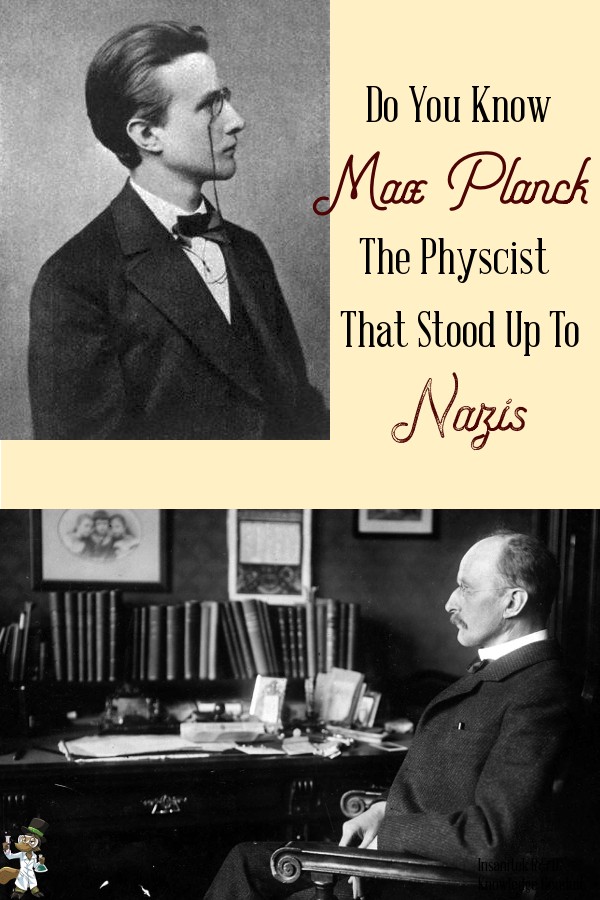 The time around the World Wars was an interesting one for science. A great many things were discovered, then invented off these new illuminations. There was one that stood out for his slow, creative genius that, through his belief that physics and chemistry are intertwined, discovered thermodynamics. Following the threads of evidence, Max Planck travelled from thermodynamics to quantum physics.
The time around the World Wars was an interesting one for science. A great many things were discovered, then invented off these new illuminations. There was one that stood out for his slow, creative genius that, through his belief that physics and chemistry are intertwined, discovered thermodynamics. Following the threads of evidence, Max Planck travelled from thermodynamics to quantum physics.